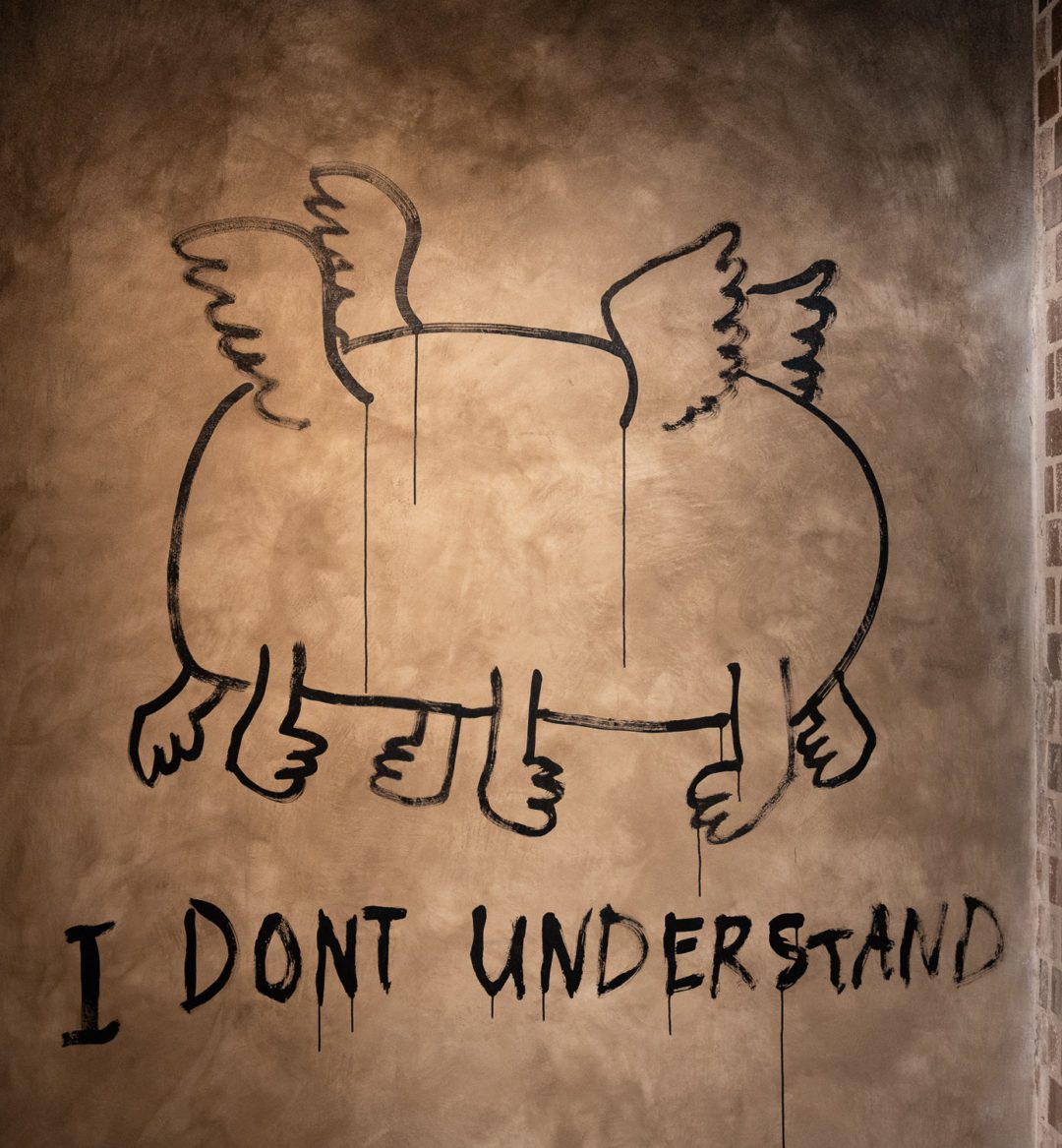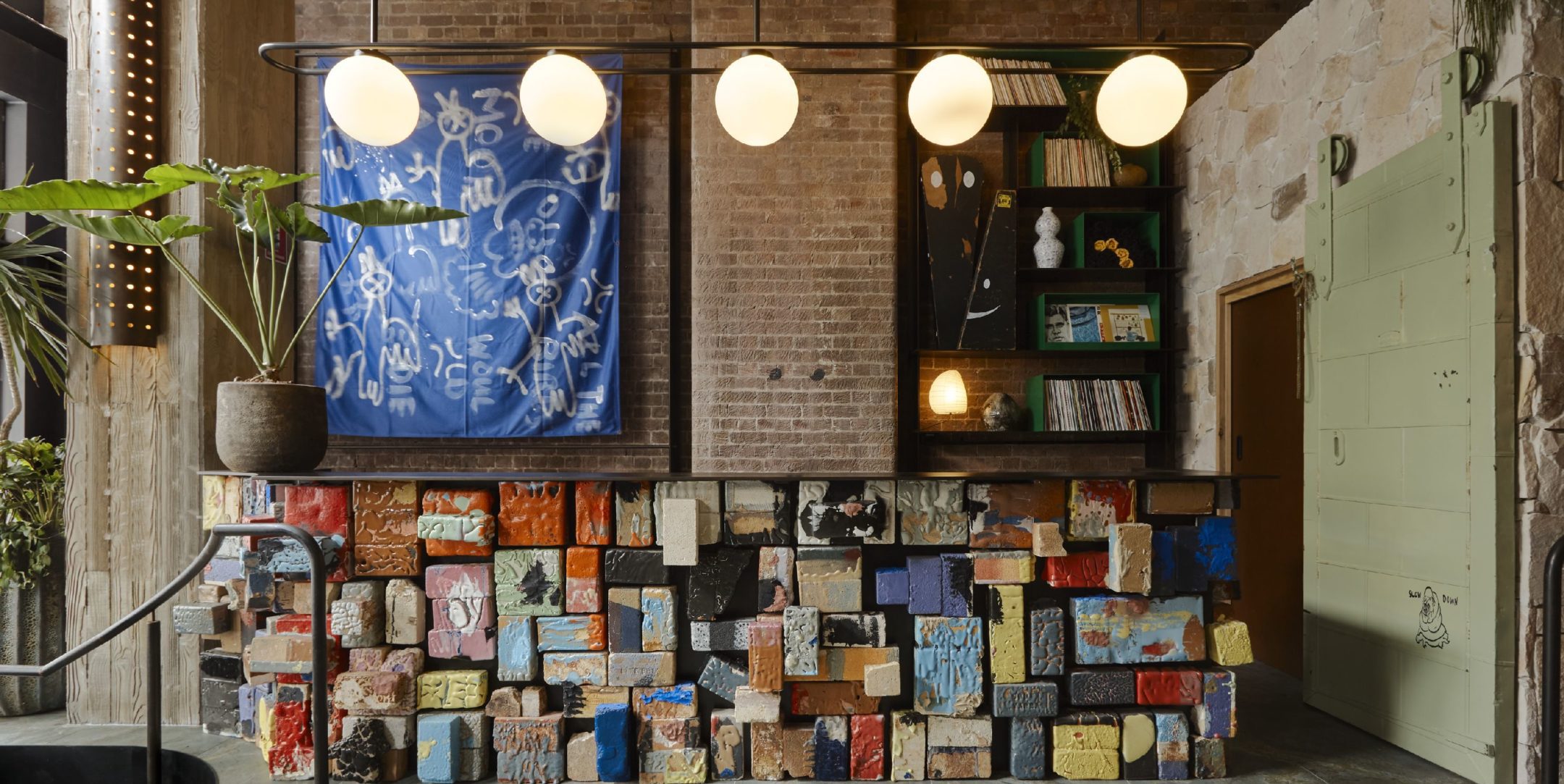Sydney Art Program
Curated by Flack Studio
Ground Floor
Tony Albert
Mid Century Modern, 2017 (16 pieces)
Gallery: Sullivan & Strumpf
Materials: pigment print on paper
Location: Ground floor passageway from Lobby to Good Chemistry, adjacent to heritage safe
Mid Century Modern is a collaborative series between Albert and the remote community of Warakurna in Western Australia created during a residency in 2017. These poignant works interrogate the representations of Aboriginal people in kitsch tourist collectibles known as ‘Aboriginalia’ through a mix of humour and darkness.
“Collaboration brings up questions that we worked through: Do we create two bodies of work or one, separately or together? We resolved this by making a collective body of work in which individual artists’ styles, ideas and voices still came through.”
Drawing on both personal and collective histories, Tony Albert’s multidisciplinary practice considers the ways in which optimism might be utilised to overcome adversity. His work poses crucial questions such as how do we remember, give justice to, and rewrite complex and traumatic histories? Albert is the first Indigenous Trustee for the Art Gallery of New South Wales. His commitment to connecting and collaborating with other Indigenous artists and the wider community within his practice, has made him an integral part of Australia’s visual arts sector and the wider Australian community.
Albert’s important work has been acknowledged industry-wide with a number of prestigious awards, prizes and commissions. His work is held in major national collections including National Gallery of Australia; Australian War Memorial; Art Gallery of New South Wales; Art Gallery of Western Australia and Queensland Art Gallery | Gallery of Modern Art.
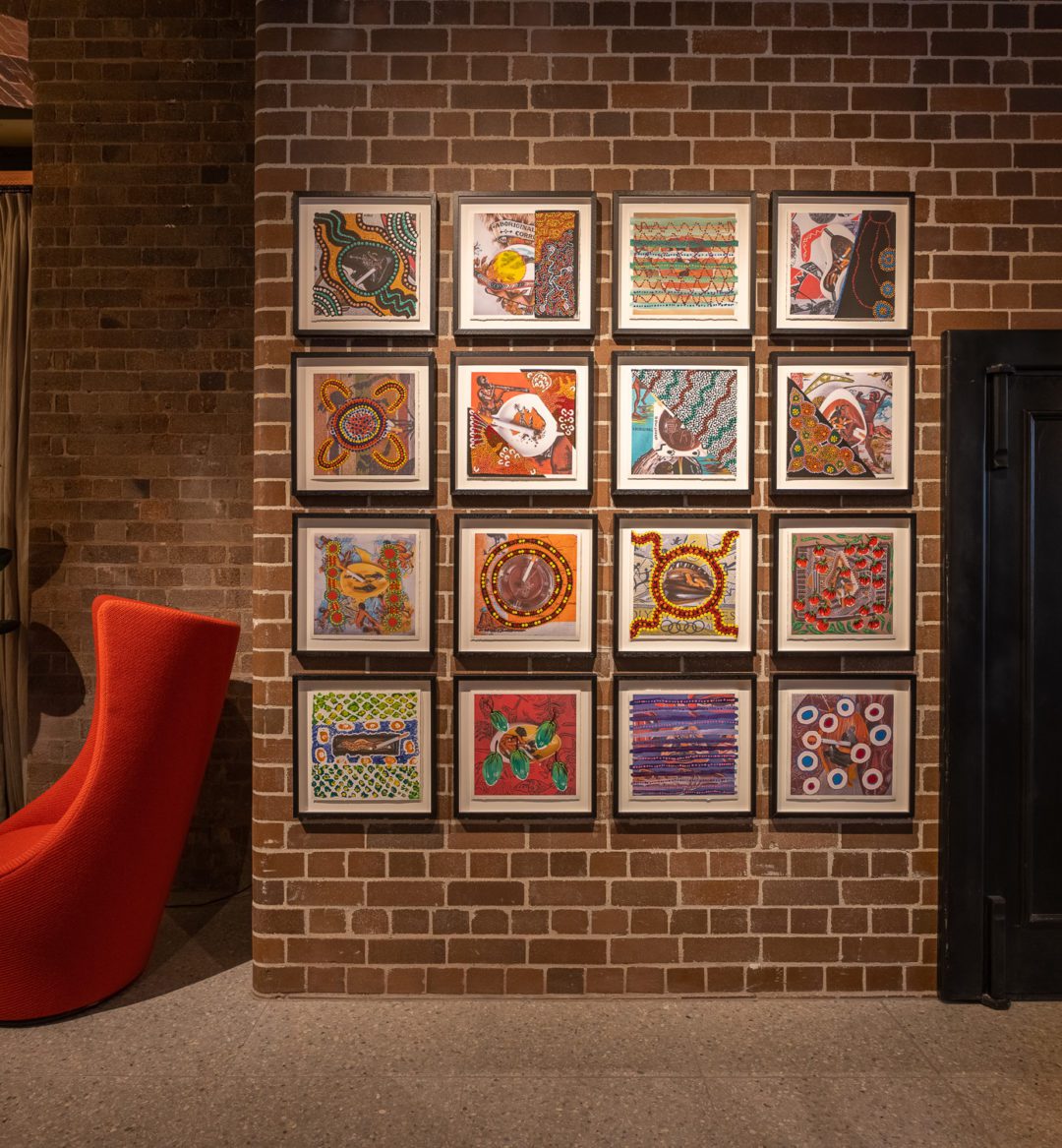
Glenn Barkley
Gallery: Sullivan & Strumpf
Location: Lobby Lounge — Collection of Sculpture, Ceramic Library
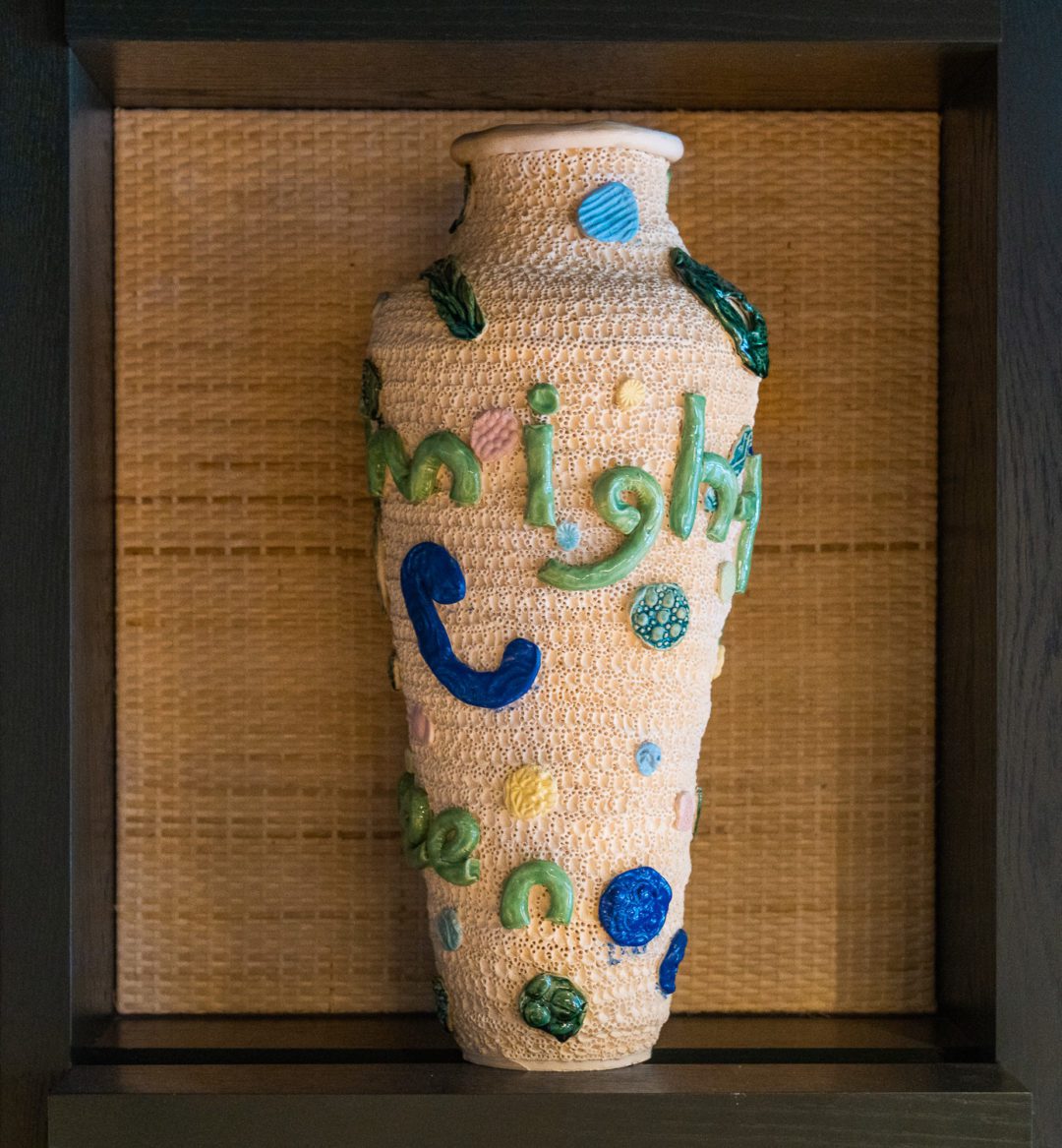
Glenn Barkley
Wall Vase for Jonathan Leak
Gallery: Sullivan & Strumpf
Materials: Earthenware
Location: LOAM, on wall
“Wall Vase for Jonathan Leak is a large terracotta wall work that references the work of the convict potter Jonathan Leak whose kiln was on the site of Ace Hotel. It is installed, and was made, on Gadigal land.
The work is made from terracotta and covered in a dense array of images— some cut and shaped, others from moulds—including shells, coins, plaques, faces and stamps which points to kiln shards found on site. The terracotta references the clay that drew Europeans here to make bricks and functional vessels, but also its material importance to Aboriginal people for decoration and other utilitarian purposes. The images are strewn across the work in a way that may recall archaeological strata and the post-Leak use of the site by Sydney’s Chinese community which was swept away in clearances and demolitions in the 20th century.
The piece is anchored by a large shell vase that references the late 18th century European tradition since called ‘vasemania’—where images of vases were used as lavish decoration in interiors—roughly contemporaneous at the time Leak was making his rustic bottles and bricks. Three birds are represented in the work and are based on early European colonial watercolours of birds held by the State Library of NSW.
I made the work in early 2022 specifically for the space. I wanted something that tangentially acknowledged the history of the place as well as being joyful and celebratory. It is the largest work I have made in this way and the process of making it has opened up potential new ideas for future work.”
Glenn Barkley is an artist, writer, curator, and gardener based in Sydney and Berry NSW. His work operates in the space shared by these overlapping interests, with colourful, playful sculptures inspired by the history of ceramics, popular music, the garden, and conversations about art and the internet.
Barkley has work in the Art Gallery of South Australia, the National Gallery of Australia and Artbank Sydney. He is co-founder of Kilnit Experimental Ceramics Studio Glebe and the Curators Department. Previously he was senior curator at the Museum of Contemporary Art Australia and curator of the University of Wollongong Art Collection.
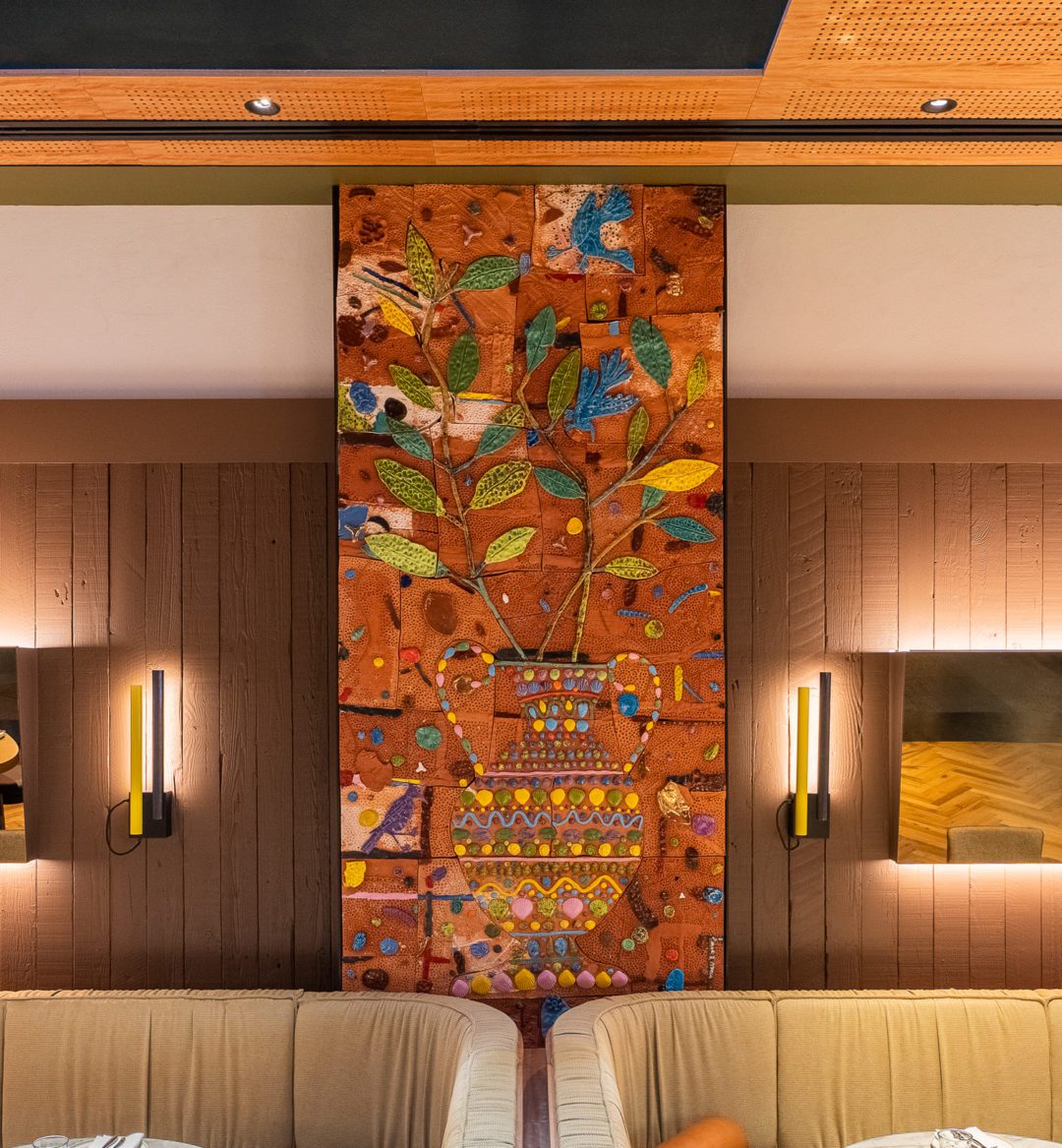
Zoë Croggon
Magazine #5, 2020
Gallery: Daine Singer Gallery
Materials: Collage of found images and glue on paper, perspex frame
Location: Lobby Lounge — Collection of Sculpture, Ceramic Library
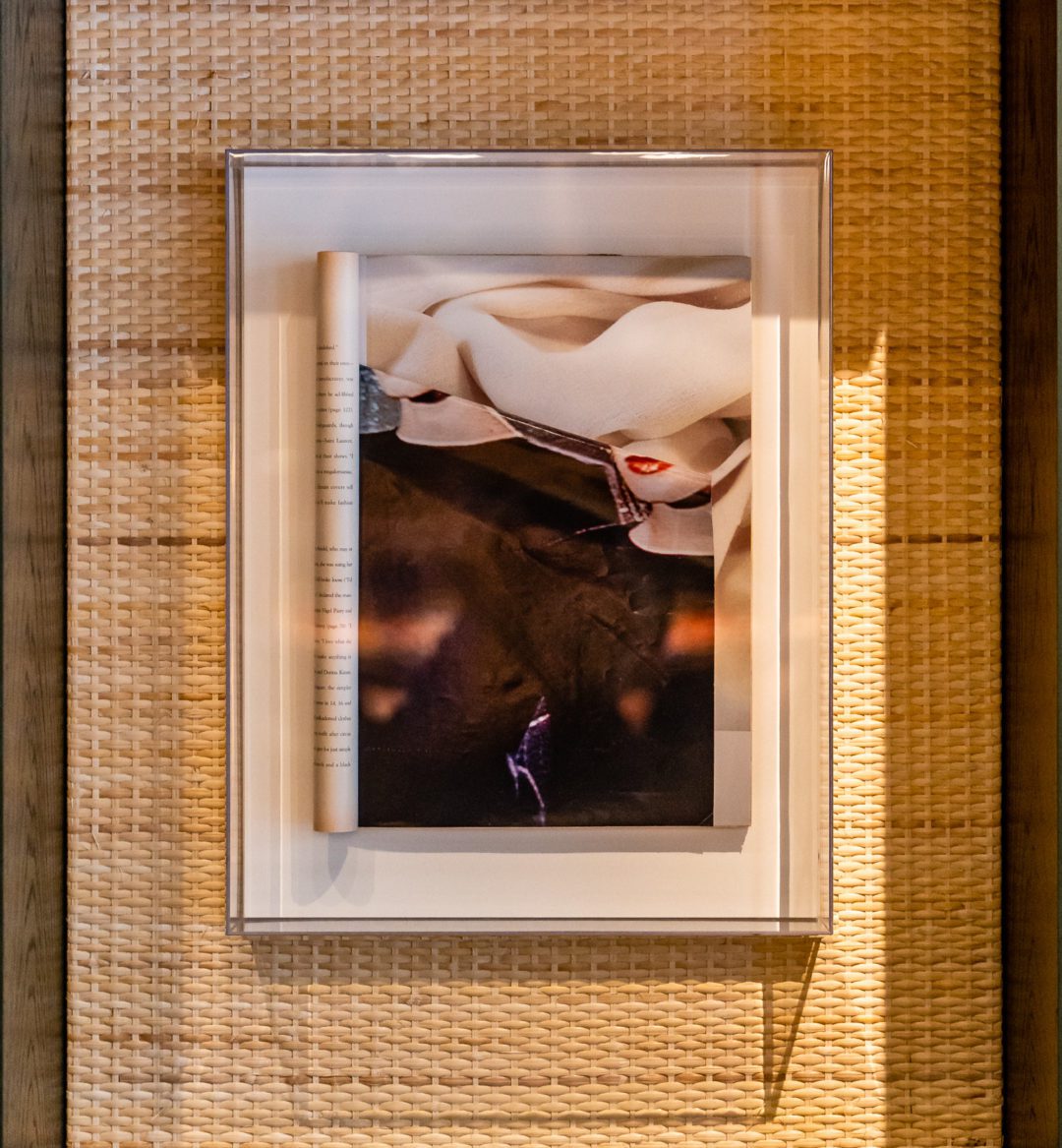
Scott Duncan
Ohio Star Shine
Gallery: Egg & Dart
Materials: Earthenware, underglaze and glazes
Location: Lobby Lounge — Collection of Sculpture, Ceramic Library
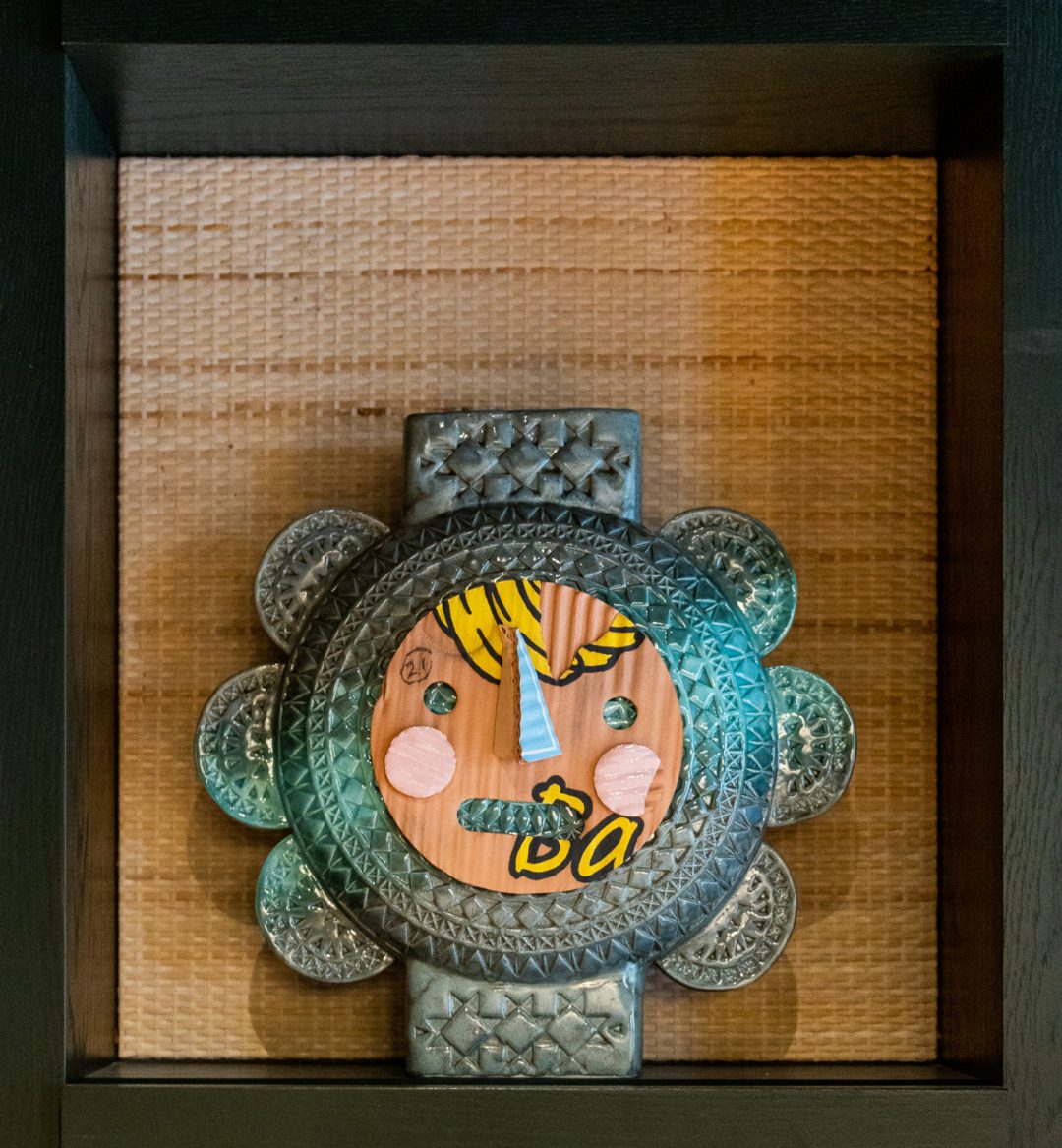
Nadia Hernández
Protegida, nos llaman (tiernos, raspados, semi-licuados) / Protected, they call us (tender, scraped, semi blended), 2021
Gallery: STATION
Materials: Oil, flashe, acrylic, felt, cotton, and ribbon on linen
Location: Lobby lounge, near Wentworth Ave entry
“My artwork for Ace Hotel Sydney holds a multitude of meanings: one part blessing another part recipe, taking the words protegida (protected) and nos llaman (they call us) from a note written by my mother, and tiernos, raspados, semi-licuados (tender, scraped, semi-blended) from her recipe on how to make cachapas, a delicious Venezuelan dish made from fresh tender corn batter’.
In my work, I often use text extracted from familial exchanges as an act to preserve our cotidianidad (everydayness) and a way to retain a sense of togetherness despite physical distance – a way to feel at home.”
Nadia Hernández makes art as a means to connect with a sense of place that exists beyond psychic and geographic boundaries, informed by her diasporic experience as a Venezuelan living in Australia. She negotiates complex narratives, weaving the personal and the political, to create a highly recognisable visual language expressed through colourful textiles, paper constructions, paintings, installations, sculptures, and murals.
Hernández was the winner of the 2019 Churchie National Emerging Art Prize, one of Australia’s leading prizes for emerging artists, and the winner of the 2021 Grace Cossington Smith Art Award. She was the official artist for the city of Sydney’s New Year’s Eve celebrations in 2017.
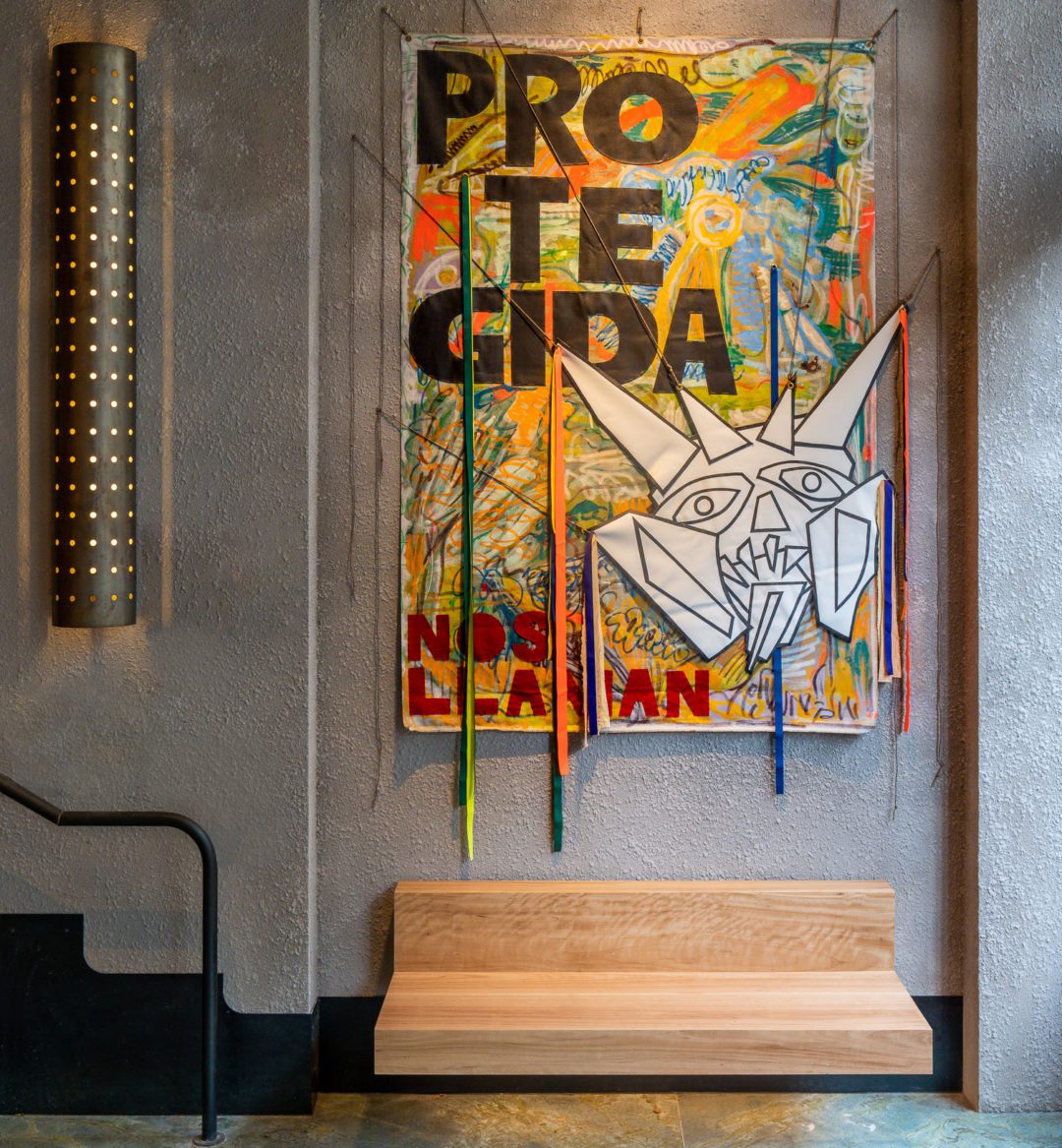
James Lemon
Brick Facade, 2022
Materials: Kiln bricks, glaze, enamel, epoxy
Location: Front desk
“I come from 8 generations of brick layers, in some ways I’m continuing my family’s trade. This work is a glazed sculpture made from decommissioned kiln bricks. I’ve been working with kiln bricks for a few years now. Bricks are more or less made from mud; their use has been instrumental in expanding society.
They’re also used to make the kiln, a structure capable of housing the volcanic energy required to make ceramic objects which we use to make art and design objects. The work is industrial and geometric yet layered in the gestures of my colourful glaze application as well as marks made by hands and fire before me.”
James Lemon’s ceramic works reflect his humour and physical gestures, as well as social and philosophical concerns. References to religion, pop culture, and global ceramic forms are woven into his colourful, highly textural works, which can take on a slapstick effect. Lemon works primarily with clay, but embeds other objects like bricks, precious stones, and discarded ephemera into his art to develop his own sculptural language. His work has been featured in publications such as Architectural Digest, Vogue Living, Vault Magazine, and The Journal of Australian Ceramics. He has exhibited multiple times for Melbourne Design Week and is represented in the permanent collection of The National Gallery of Victoria. James Lemon currently lives and works in Melbourne.
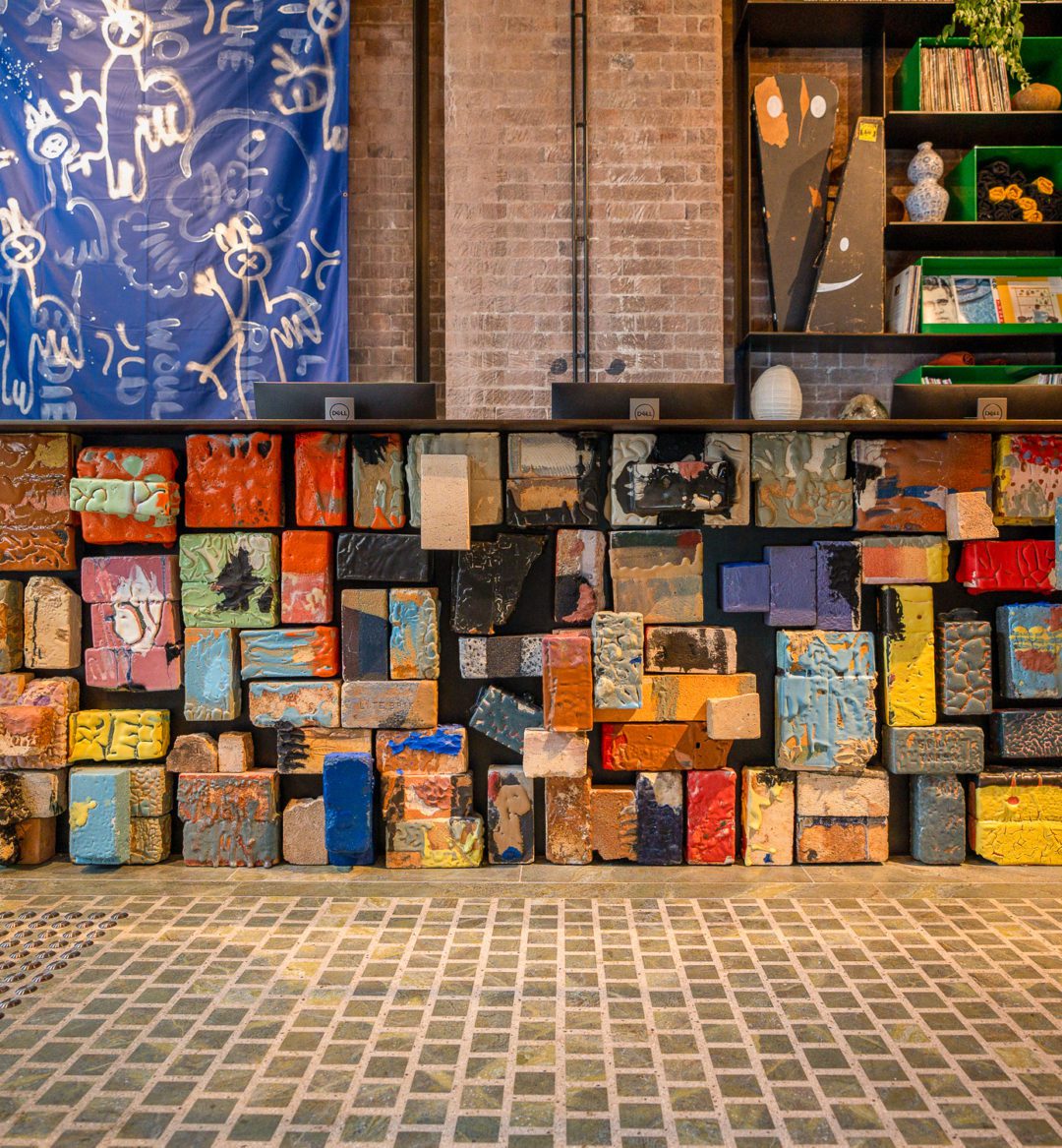
Ben Mazey
Custom Black Line Stamped Lamp, 2022
Gallery: C Gallery
Materials: Glazed earthenware, metal, LED bulb
Location: Lobby Lounge — Collection of Sculpture, Ceramic Library
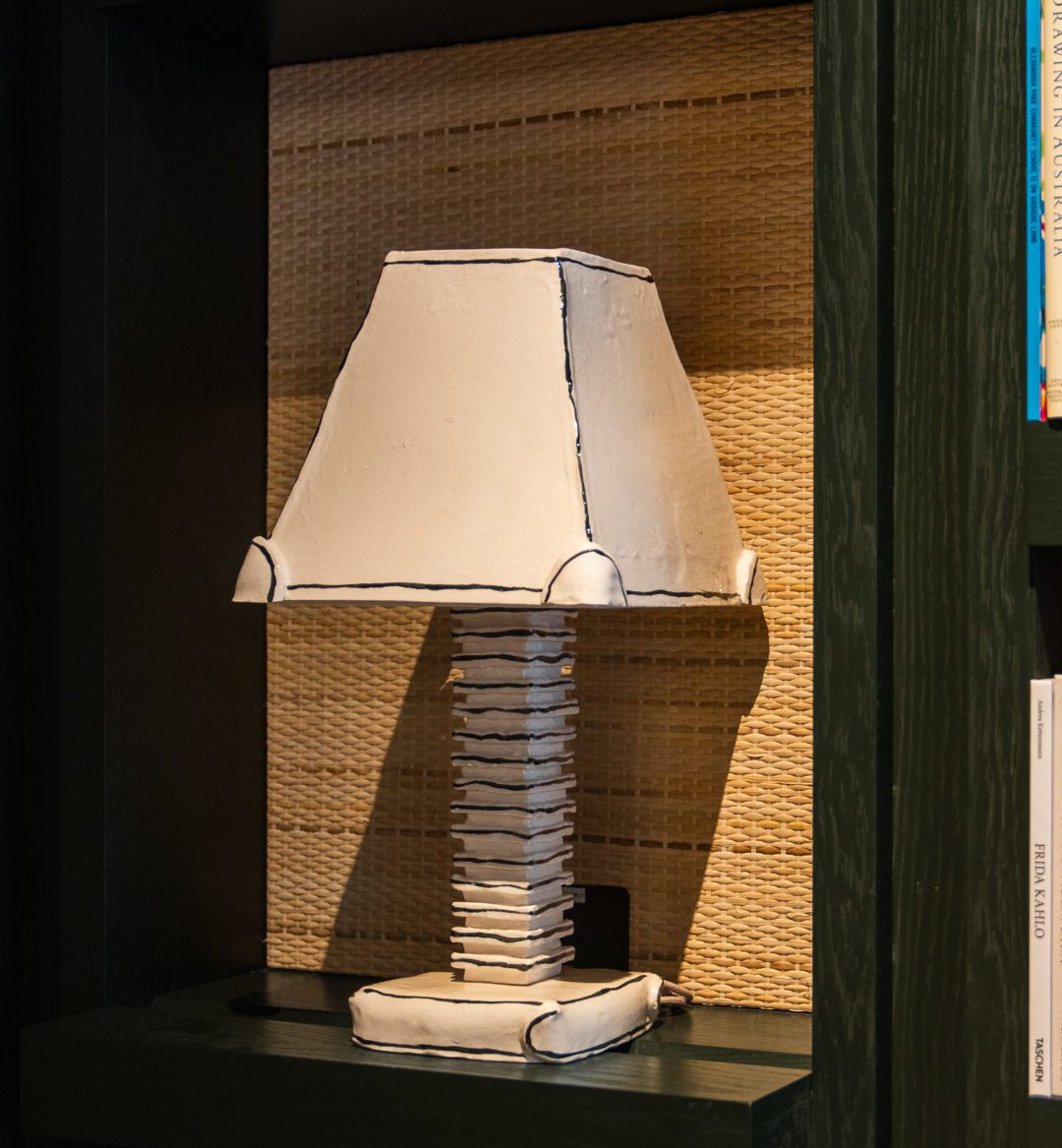
Laith McGregor
Vessel (OSO), 2022
Gallery: STATION
Material: Glazed Ceramic
Location: Ground Floor entryway, behind front desk (on shelf)
Working across drawing, painting, ceramics and sculpture, Laith McGregor’s multi-disciplinary practice reflects an ongoing inquiry into contemporary portraiture, semiotics of image making and notions of the self. With pieces incorporating laborious, hyper-realistic illustration, accumulations of pencil and eraser shavings, and other processes that form a meditative daily ritual, his practice is resolutely underpinned by a commitment to physical studio work and the marking of time.
McGregor’s works wrestle with the grey area that exists between fiction and non-fiction, negative and positive, black and white, two- and three- dimensions, serving an ongoing inquiry into the complexities of what it means to be human. McGregor has exhibited extensively in Australia and internationally, and is represented in significant institutional collections.
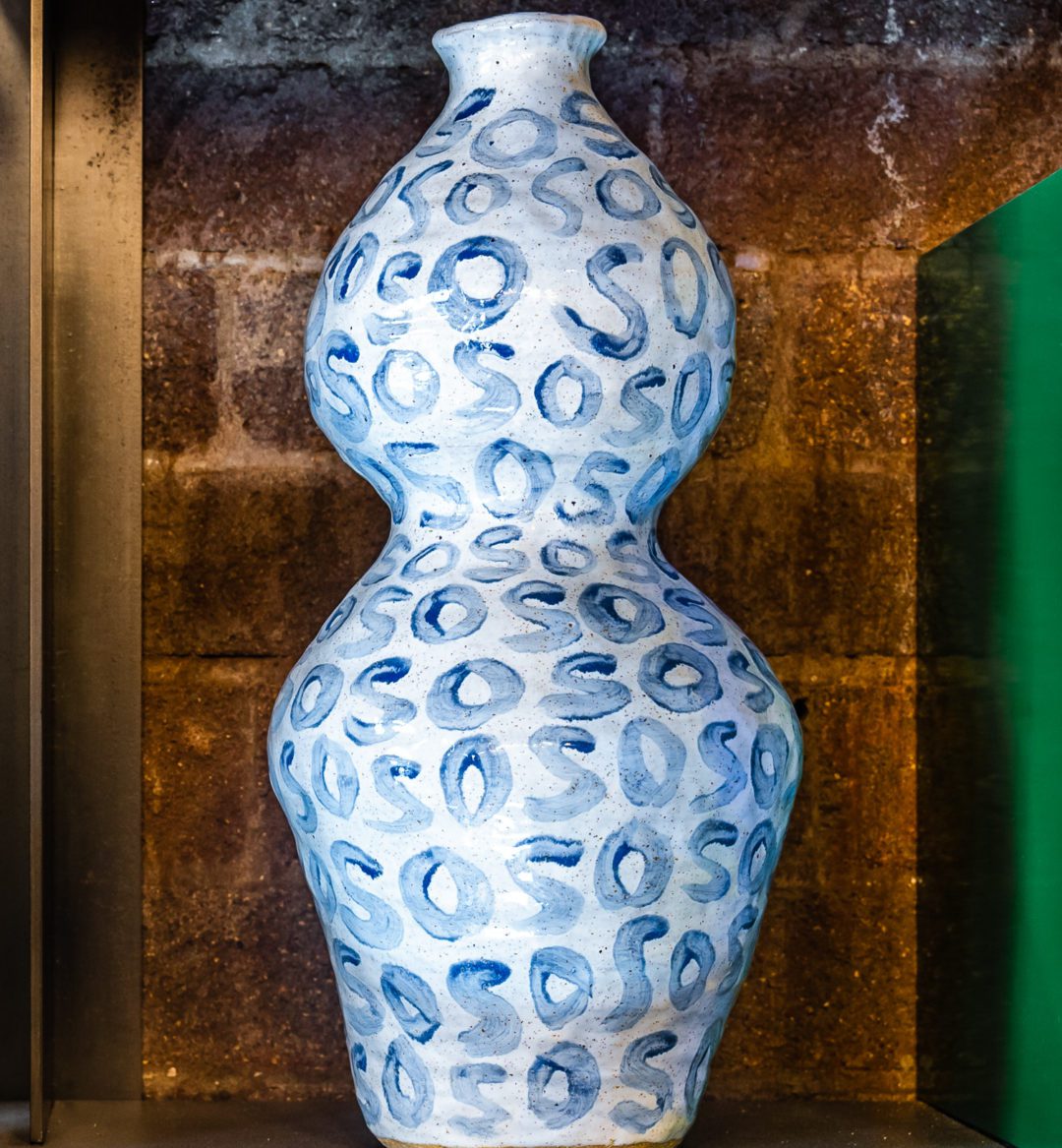
Laith McGregor
Vessel (Fallen), 2022
Gallery: STATION
Materials: glazed ceramic and cue balls
Location: Lobby Lounge — Collection of Sculpture, Ceramic Library
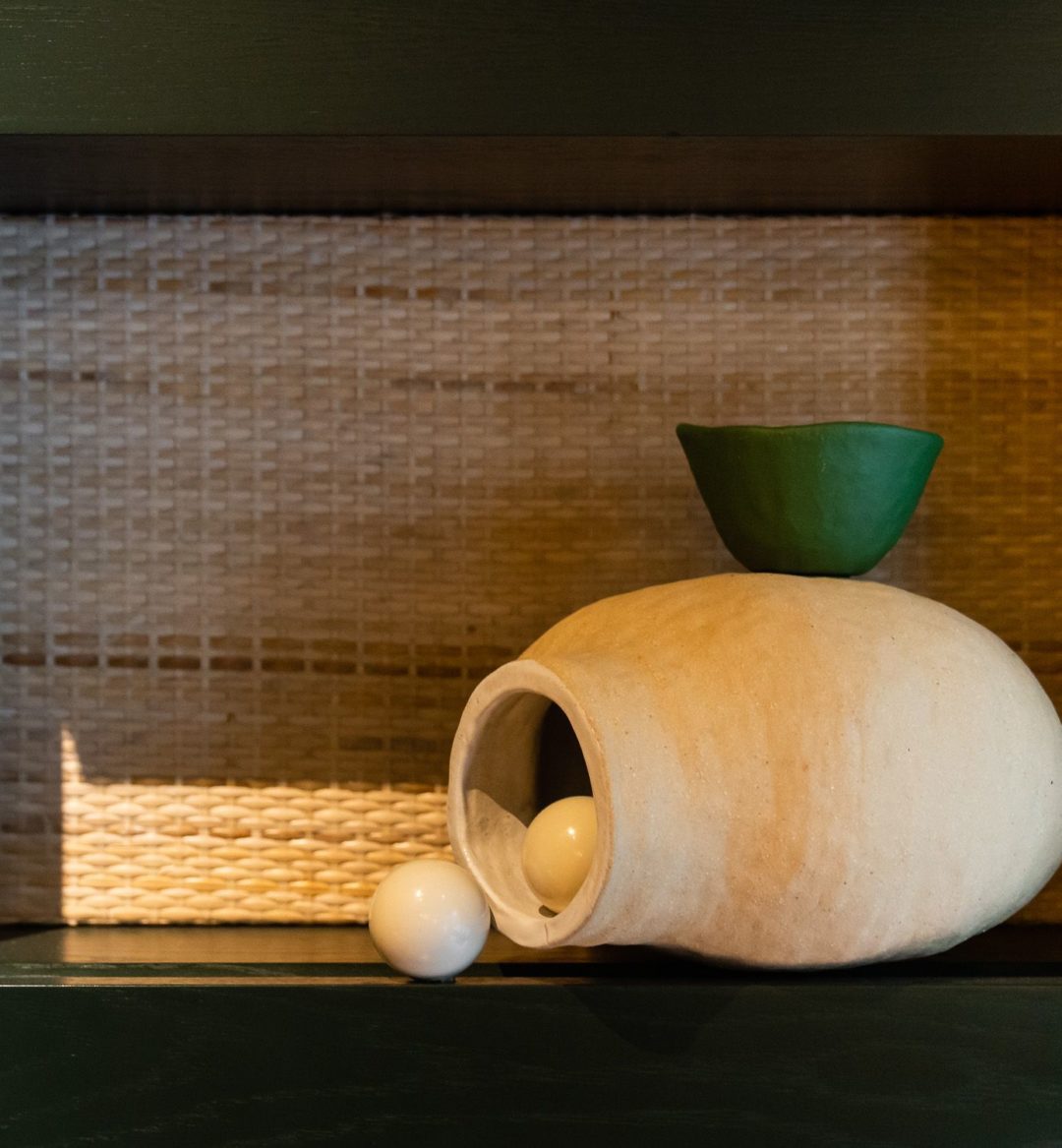
Sanné Mestrom
30 Fistfuls of Love
Gallery: Sullivan & Strumpf
Materials: Bronze
Location: Lobby lounge
“30 Fistfuls of Love is a bronze sculpture I made specifically for the Ace Hotel building. I threw three handfuls of clay at a makeshift pillar I’d reconstructed in the foundry. Each handful of clay holds an impression of both my hands and the architecture of the site—in the specific way it splattered across the pillar. I then cast this collection of impressions in bronze. The resulting bronze sculpture became the shimmer of space between my body and the world it inhabits.”
Sanné Mestrom produces large scale sculpture and drawings in a materially rich palette including bronze, concrete, steel, marble, stone and glazed tile. She works with the full range of possibilities offered by her chosen materials and often combines two or more materials for their potential contrasts of colour, tone, texture and form. Mestrom’s sculptures are memorable for their engaging tactile presence.
Her works give voice to strong organic and geometric forms with imagery in dialogue with both figurative and abstract modernist legacies. Simplicity and ease of shape are the building blocks of dynamic
relationships between bodies, the work and the space that surrounds them. She engages a wide range of disciplines and endeavours, including public art and play, architecture as well as natural phenomena governing daily life like time, gravity and the sun.
While Mestrom’s works are highly compelling visually, with their curvilinear language, they are completed by their communication with surrounding architecture creating conversations of monumentality, permanence and precision. Similarly, they require the day-to-day lived experience and presence of the viewer, communicating with body, perception, assumption and meaning.
“In my art I’m interested in the membrane between body and world—the ways that architecture and the built environment informs, frames, limits and expands the ways we move through it with our bodies”.
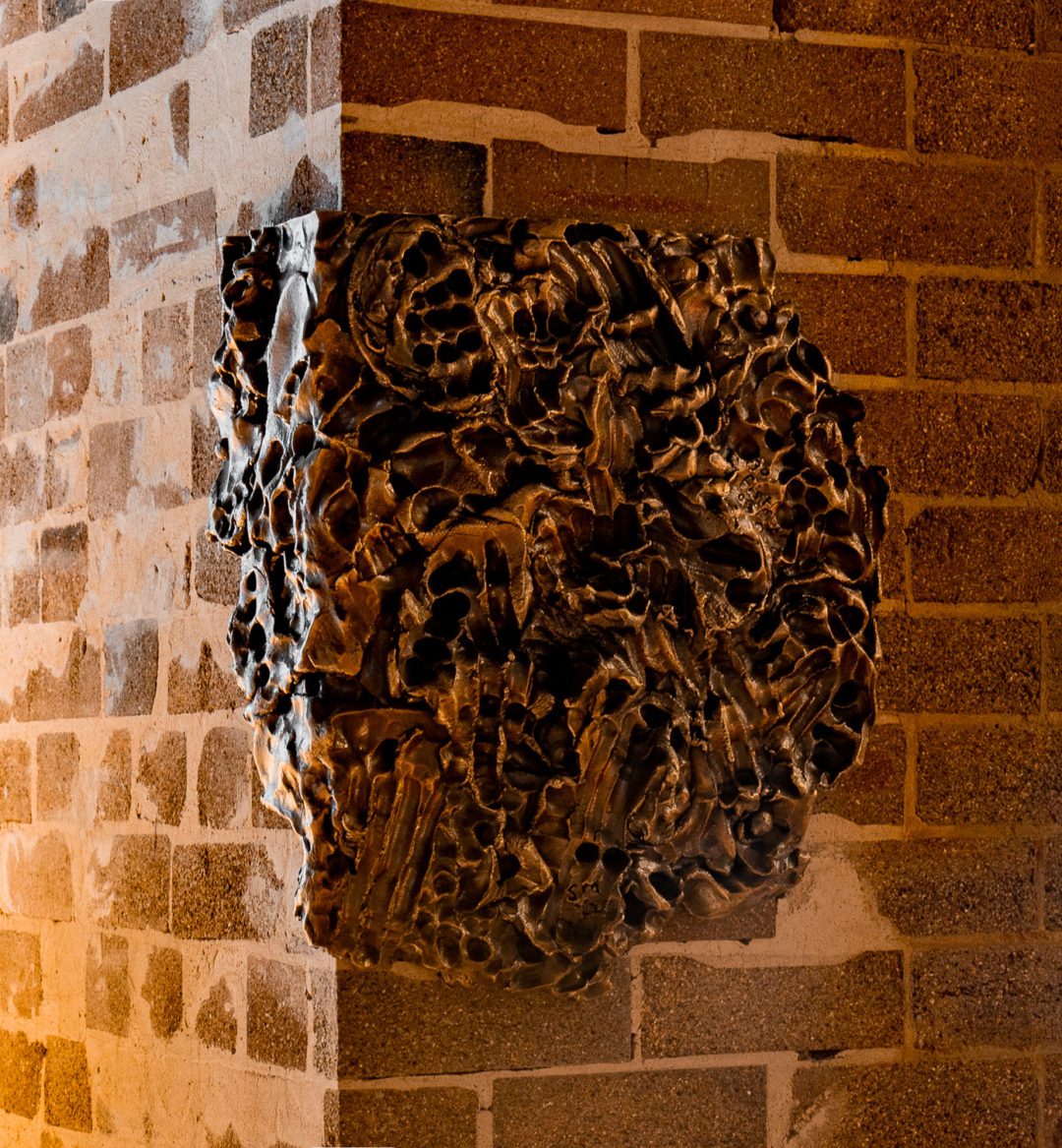
Nell
Two Sounds, 2021
Gallery: STATION
Materials: 1960s Japanese Guitar Case, 1970s Coffin Guitar Case, acrylic paint and archival glue
Location: Ground Floor entryway, behind front desk
“For me, art and music are simultaneously essential and mysterious. Art and music are the life medicine I self-prescribe every day. I think of the artworks in my exhibitions like tracks on an album – sometimes a concept album, sometimes a mix tape.”
Nell’s practice spans painting, sculpture, performance, video, music, collaborations and public art, with scales ranging from small intimate objects, to large immersive installations. Regardless of material outcome, her work explores oppositional thresholds, such as the ancient and contemporary, individual and communal, feminine and masculine, and the sacred and profane.
From an Australian vantage point, she uses the language of art history, popular culture and spiritual traditions to amplify or challenge these tensions so that new objects, which are both playful and intriguing, emerge. Highly symbolic motifs, including smiley faces, ghosts, eggs, teardrops and lightning bolts, reappear throughout her works as a tool for communicating the extremes of human existence.
Across two decades, Nell’s work has been included in over 250 exhibitions in Australia and abroad, and she is represented in significant institutional collections.
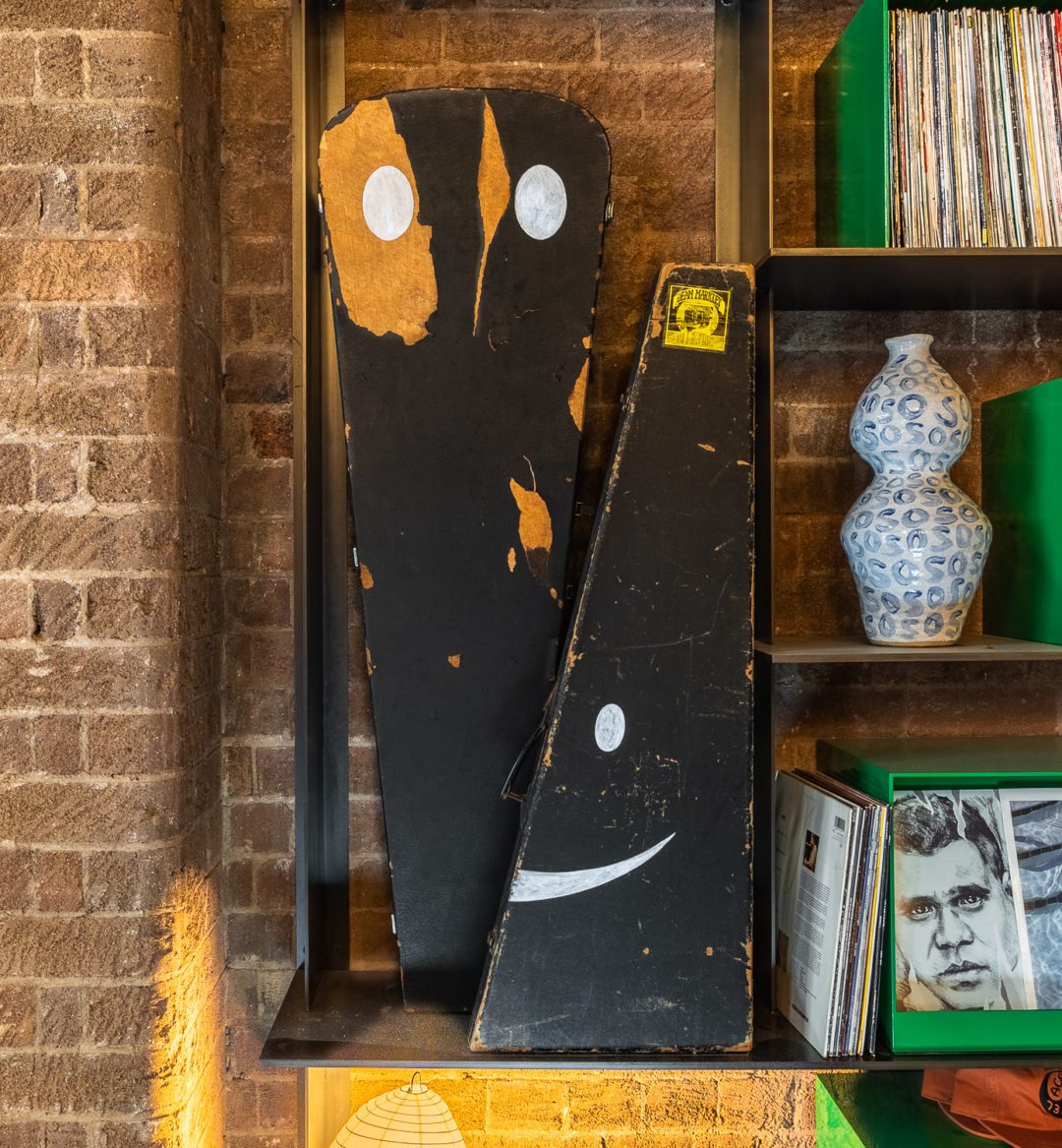
Nell
Ghost Songs (black #2), 2021
Gallery: STATION
Materials: 2 parts; Marshall amp, hand blown glass
Location: Lobby Lounge — Collection of Sculpture, Ceramic Library
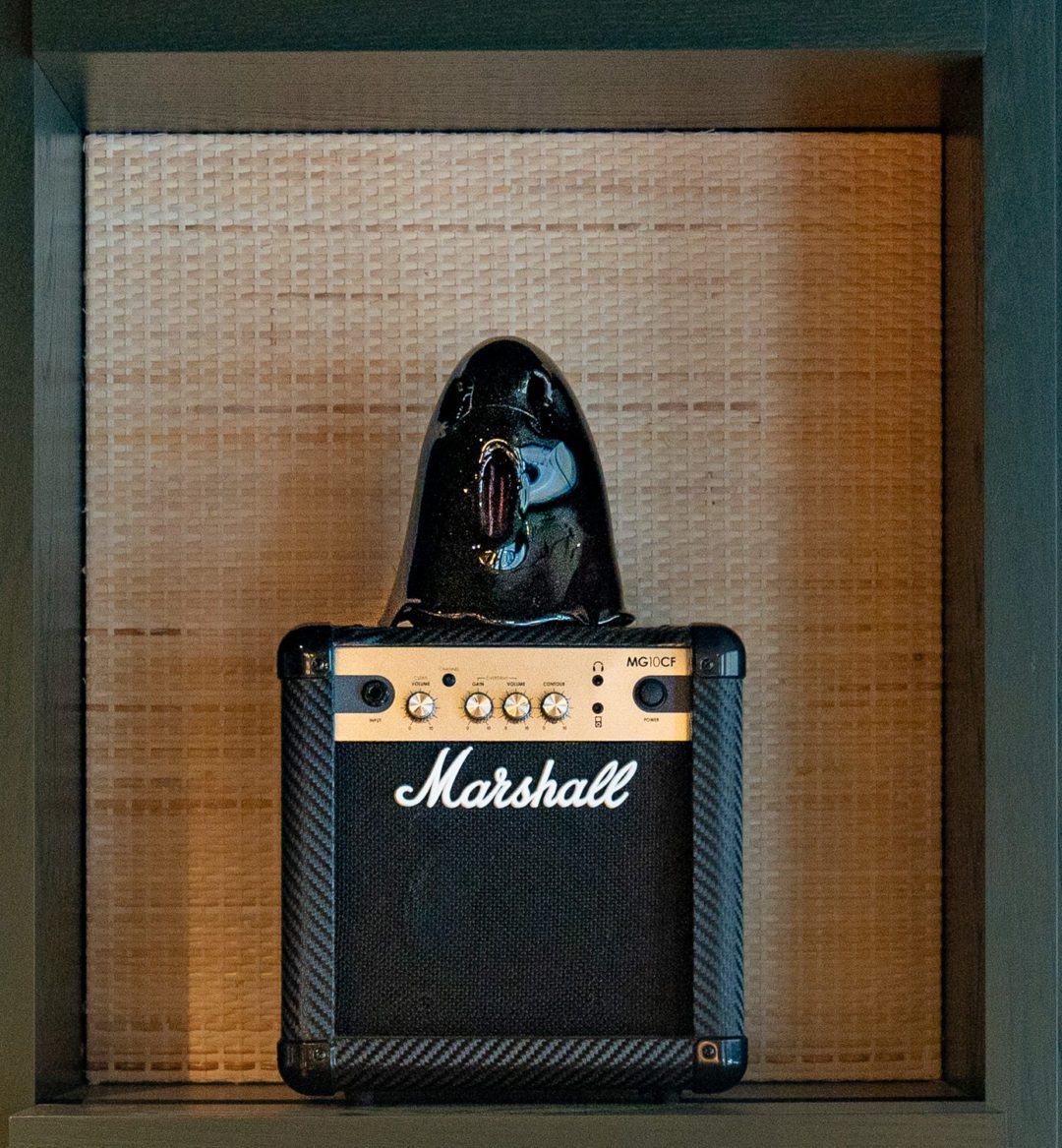
Ramesh Mario Nithiyendran
Triangular headed figure, 2021
Gallery: Sullivan & Strumpf
Materials: Earthenware
Location: Sunken lounge
“My work at Ace Hotel Sydney is one of the more complex and ambitious ceramic sculptures I’ve made. I’m not interested in symmetry or formality. I often work sculpturally with threshold spaces. Encouraging viewers to think alternatively about spaces they inhabit through encounters with figurative sculpture is key to my work.”
Ramesh Mario Nithiyendran is a Sri-Lankan born contemporary artist who explores global histories and languages of figurative representation. He has specific interests in South Asian forms and imagery as well as politics relating to idolatry, the monument, gender, race and religion. While he is best known for his irreverent approach to ceramic media, his material vernacular is broad. He has worked imaginatively with sculptural materials including bronze, concrete, neon, LED and fibreglass, as well as conventional painting and printmaking materials and techniques.
His signature neo-expressionist and polychromatic work has been presented in museums, festivals, multi-art centres and the public domain. This has included significant presentations at the National Gallery of Australia, Art Gallery of New South Wales, The Dhaka Art Summit, Art Basel Hong Kong and Dark Mofo festival. His first major permanent public artwork was recently installed at the entrance of the new HOTA gallery.
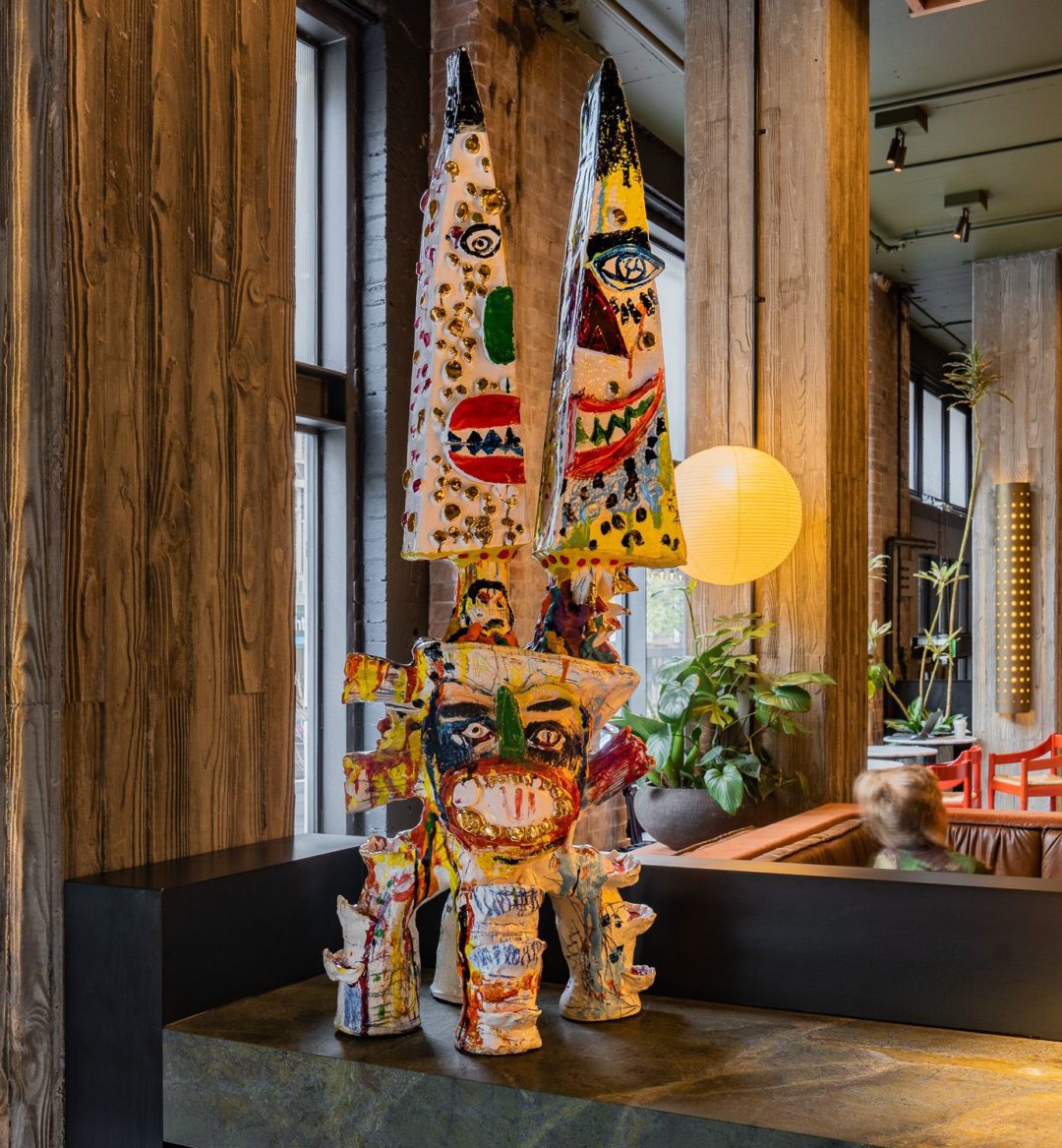
Nabilah Nordin
Hyperflux, 2022
Gallery: Neon Parc
Materials: Epoxy Modelling Compound, moldable plastic, polyurethane pigment, spray paint
Location: Lobby Lounge — Collection of Sculpture, Ceramic Library
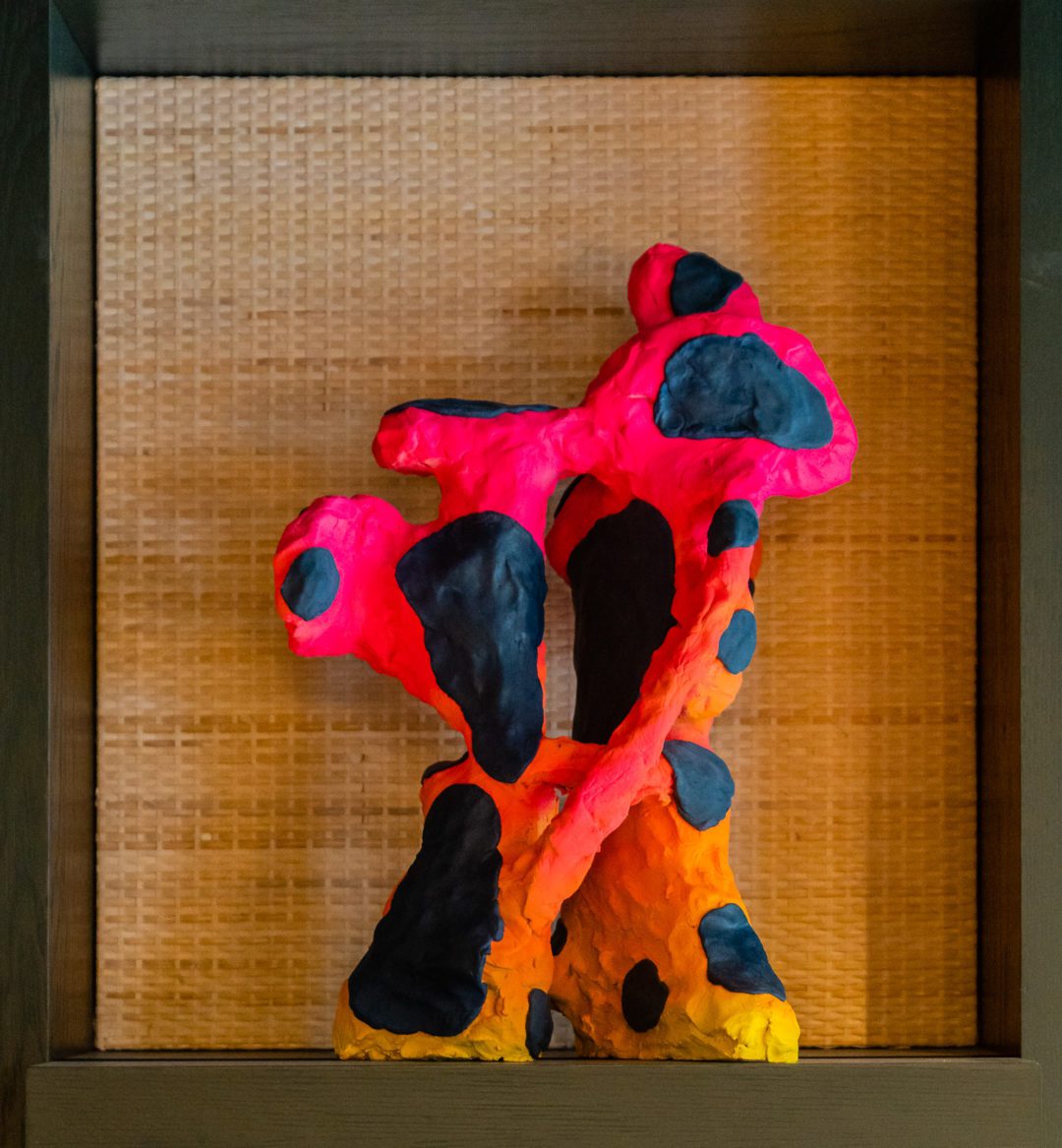
Jahnne Pasco-White
becoming with 6, 2019
Gallery: STATION
Materials: acrylic, paper, oil stick, pigment on canvas
Location: Lobby bar, on wall
Jahnne Pasco-White’s expanded painting practice explores the interconnectedness between humans and our environment. Her intuitive, generous style of abstraction articulates itself in raw, gestural paintings on fabric and canvas. Hand dyed fabrics pigmented with organic materials gathered from her surroundings ¬– including domestic debris and matter collected from the natural environment – are complemented by acrylic paint, oil stick, pastel and crayon.
Into these surfaces, she introduces segments of old paintings, cut up and reworked in an ongoing cycle of decay and renewal. Pasco-White was the winner of the prestigious Arthur Guy Memorial Painting Prize in 2019, and a finalist in the 2019 Ramsay Art Prize, Australia’s premier prize for emerging artists. In 2018 she was the recipient of an Art Gallery of New South Wales Moya Dyring Memorial Studio scholarship.
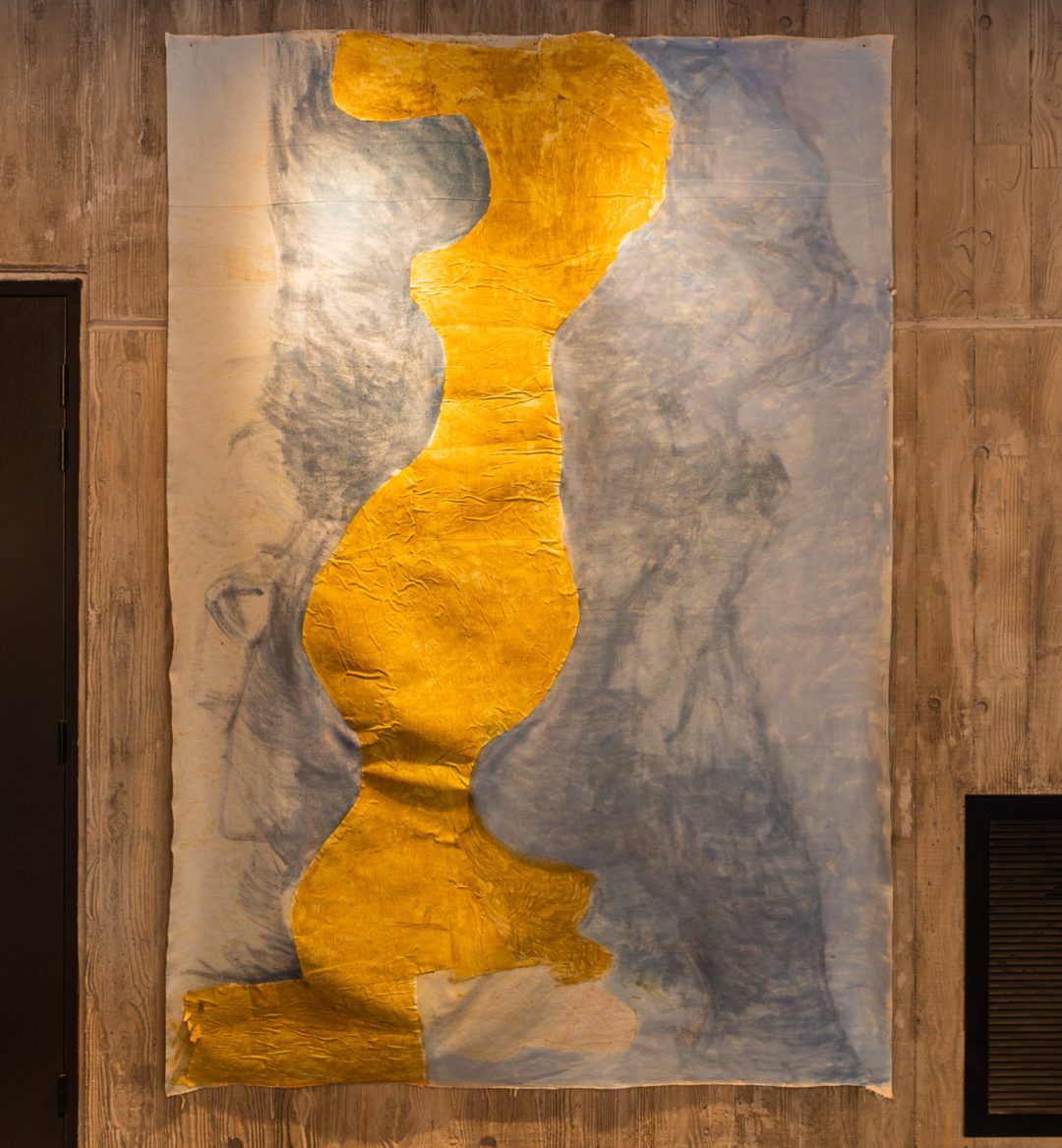
Kenya Peterson
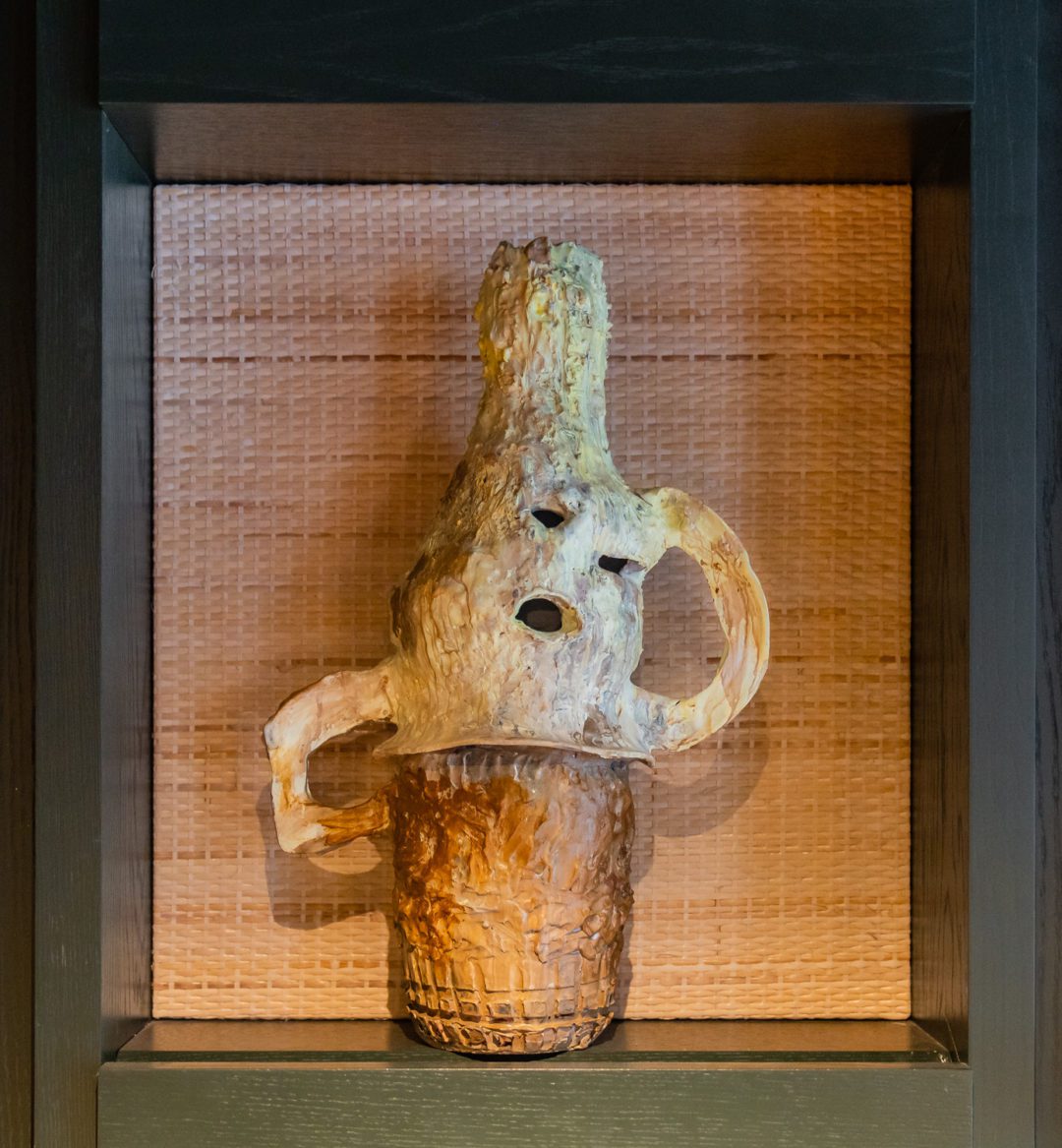
Jason Phu
if the moon farted all the birds would die, 2021
Gallery: STATION
Materials: Spray paint on nylon
Location: Ground Floor entryway, behind front desk (on wall)
Jason Phu’s multi-disciplinary practice brings together a wide range of references, including traditional ink paintings, calligraphy, readymade objects, everyday vernacular, ancient folklore, personal narratives and historical events. Working across drawing, installation, painting, performance and film, Phu frequently uses humour as a device to address identity and cultural dislocation within an Australian context.
Often employing stories of ghosts, spirits, demons and gods from Chinese culture as a personification of these concepts, Phu’s playful, deliberately naïve style and tongue-in-cheek subject matter convey a sense of connection to today’s world while being simultaneously timeless. Phu won the prestigious Sir John Sulman Prize in 2015, and the Freedman Foundation Travelling Art Scholarship, also in 2015. In 2018 he was included in the annual curated exhibition Primavera: Young Australian Artists, Museum of Contemporary Art, Sydney.
In 2019 Phu was awarded the inaugural Art Assembly commission for the Sydney Opera House, and he was awarded the 2021 ACMI X Mordant Family Moving Image Commission for Young Australian Artists.
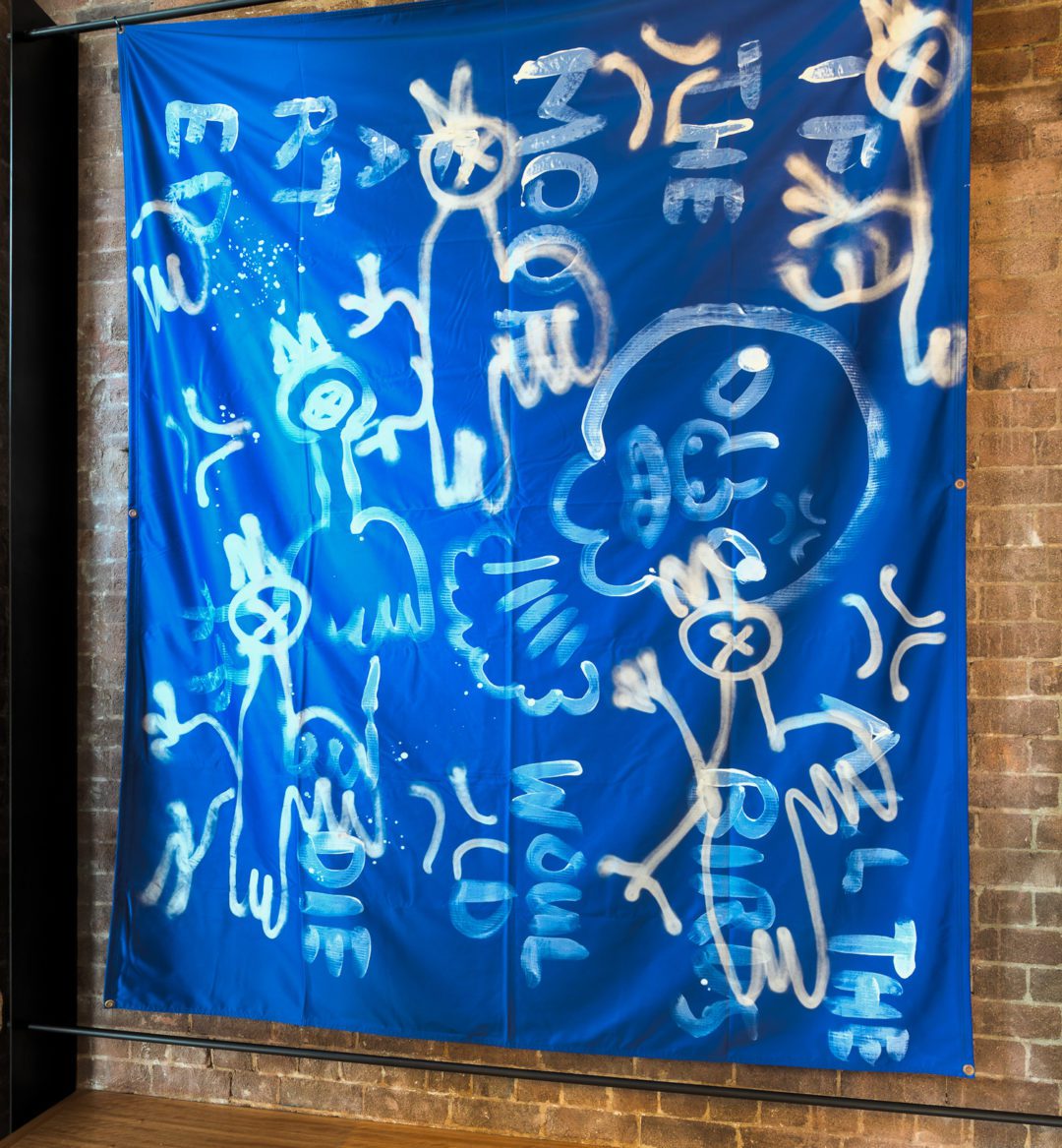
Justene Williams
Cleromancy, 2021
Gallery: Sarah Cottier Gallery
Materials: Marine carpet, Australian pennies, Copper solder
Location: Level one landing
Born 1970, Sydney, New South Wales. Lives and works Brisbane, Queensland Justene Williams is a key figure of the Australian art scene of the 1990s, working across different media including photography, video, performance, installation and sound.
Much of Williams’ work pays homage to the aesthetic bric-a-brac of German artist Kurt Schwitters’ infamous dada technique that he coined ‘Merz’ and which became the name for much of his artistic philosophy and activity.
In recent work she has constructed elaborate sets and costumes made from collaged paper and a variety of waste or refuse materials. Williams also uses found materials, past photographs and domestic objects in her stage sets and costumes. When she began to work in this way, her intention was to breathe new life into recycled detritus to see if she could animate the inanimate world of images and photography.
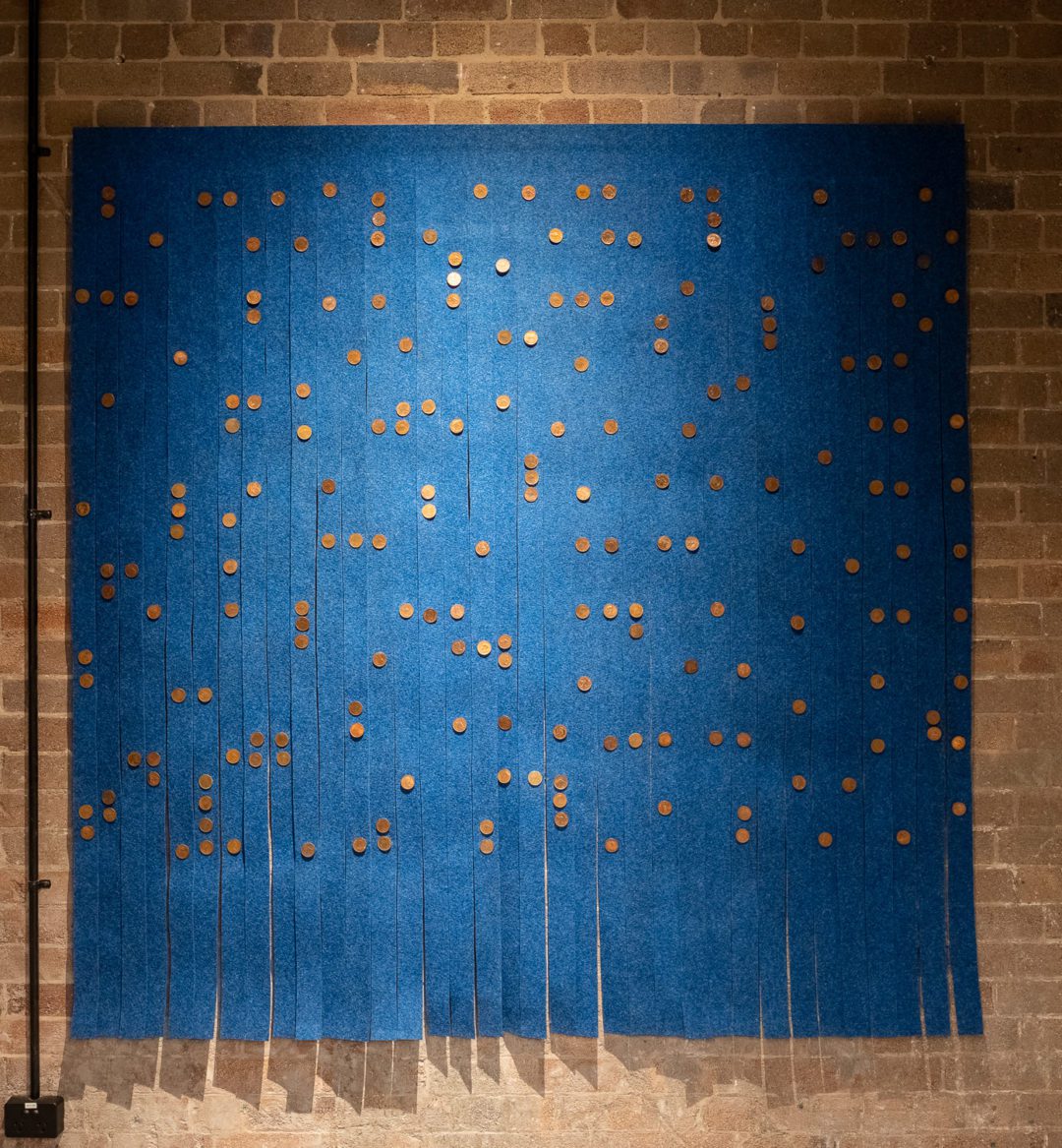
Level 1
Julia Gutman
Once more, with feeling, 2021/2022
Gallery: Sullivan & Strumpf
Materials: clothing worn by the artist and her friends, embroidery cotton and polyester thread on calico
Location: Staircase from ground floor to level one
“Once More, with Feeling is a love letter to my friends, made almost entirely out of clothing, sheets and blankets they have worn and grown in. This piece is the largest work I’ve made so far – it’s taller than my studio walls and wider than the surface area of the floor. Until it was installed, I had only seen the work in parts. It’s surreal to share something so intimate at such a monumental scale, particularly alongside the work of so many artists I admire.”
Julia Gutman is a multidisciplinary artist who reuses found textiles to produce patchworks that merge personal and collective histories to explore themes of femininity, intimacy and memory. Her practice is informed by events in her own life and by iconic art historical references. Stitching together worn garments and materials donated by friends and family members, Gutman’s work is imbued with the lived experiences of those around her. Simultaneously, the artist navigates the inherent tensions of working with cloth: rupture and nurture. Gutman holds a BFA in painting from the University of New South Wales and an MFA in sculpture from the Rhode Island School of Design. She was a finalist in the 2021 Ramsay Prize at the Art Gallery of South Australia and the 2020 NSW Visual Arts Emerging Fellowship at Artspace Sydney. She has been profiled in the Sydney Morning Herald, ABC Arts and Index Magazine, and her work has been exhibited across Australia, in Rome and New York.
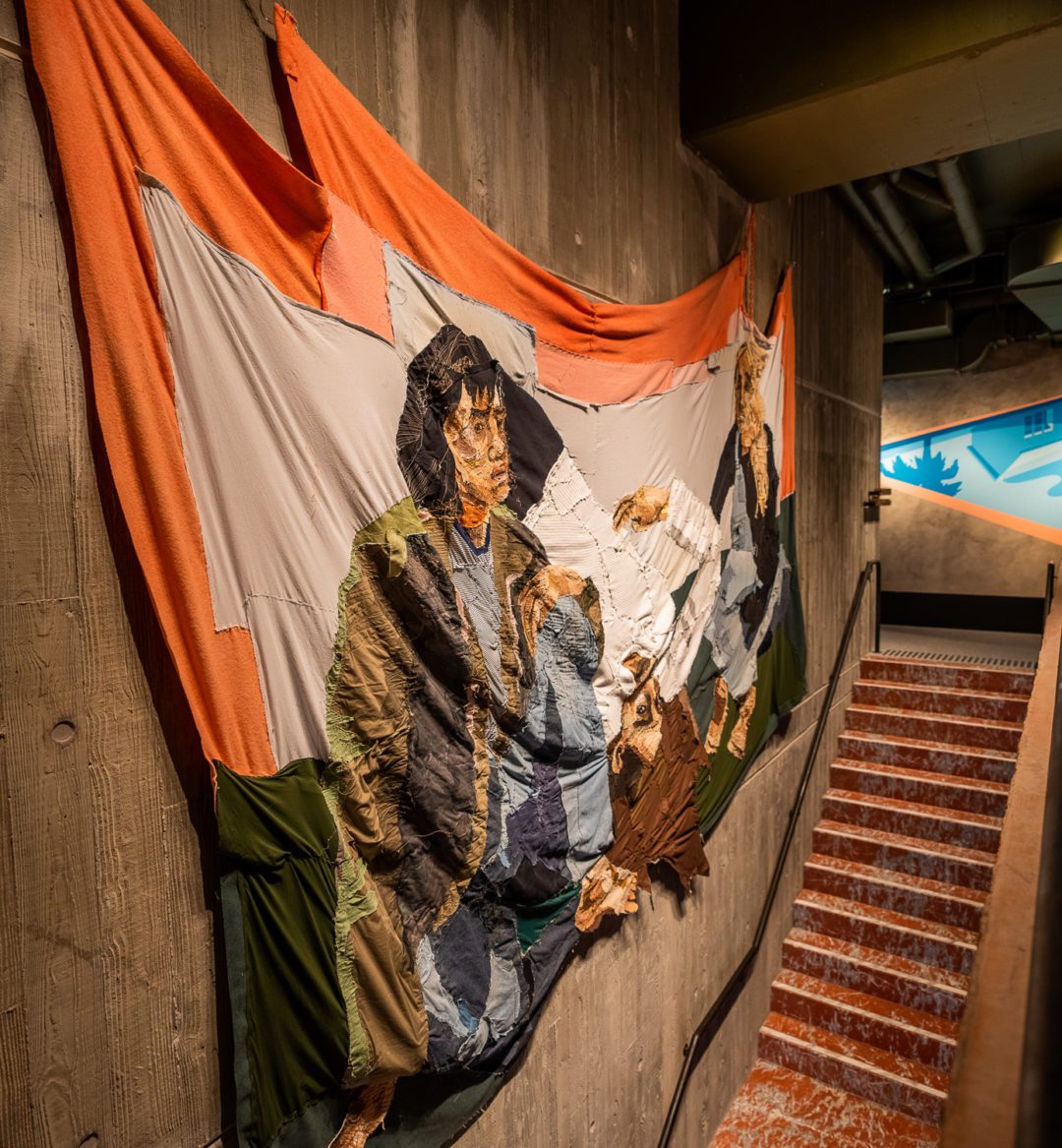
Joanna Lamb
Commission for Ace, 2021/2022
Gallery: Sullivan & Strumpf
Materials: acrylic paint
Location: Level one landing
Joanna Lamb is a painter and printmaker from Perth. Her highly refined geometric compositions waver between realism and abstraction in their scenes of contemporary life. Generic domestic interiors and suburban spaces like homes, highways and airports are reduced to flat blocks of colour, contrasted with detailed depictions of plants, animals, cars and people. It’s a practice that draws from the commercial perfection of real estate advertisements and the aesthetic monotony of the Australian suburban landscape.
Through this distillation of colour, dimension and form, Lamb’s everyday environments are made both striking and familiar. Lamb was voted one of Australia’s 50 Most Collectable Artists by Australian Art Collector. Her works are included in the collections of the Art Gallery of Western Australia, Parliament House, The University of Western Australia and Murdoch University.
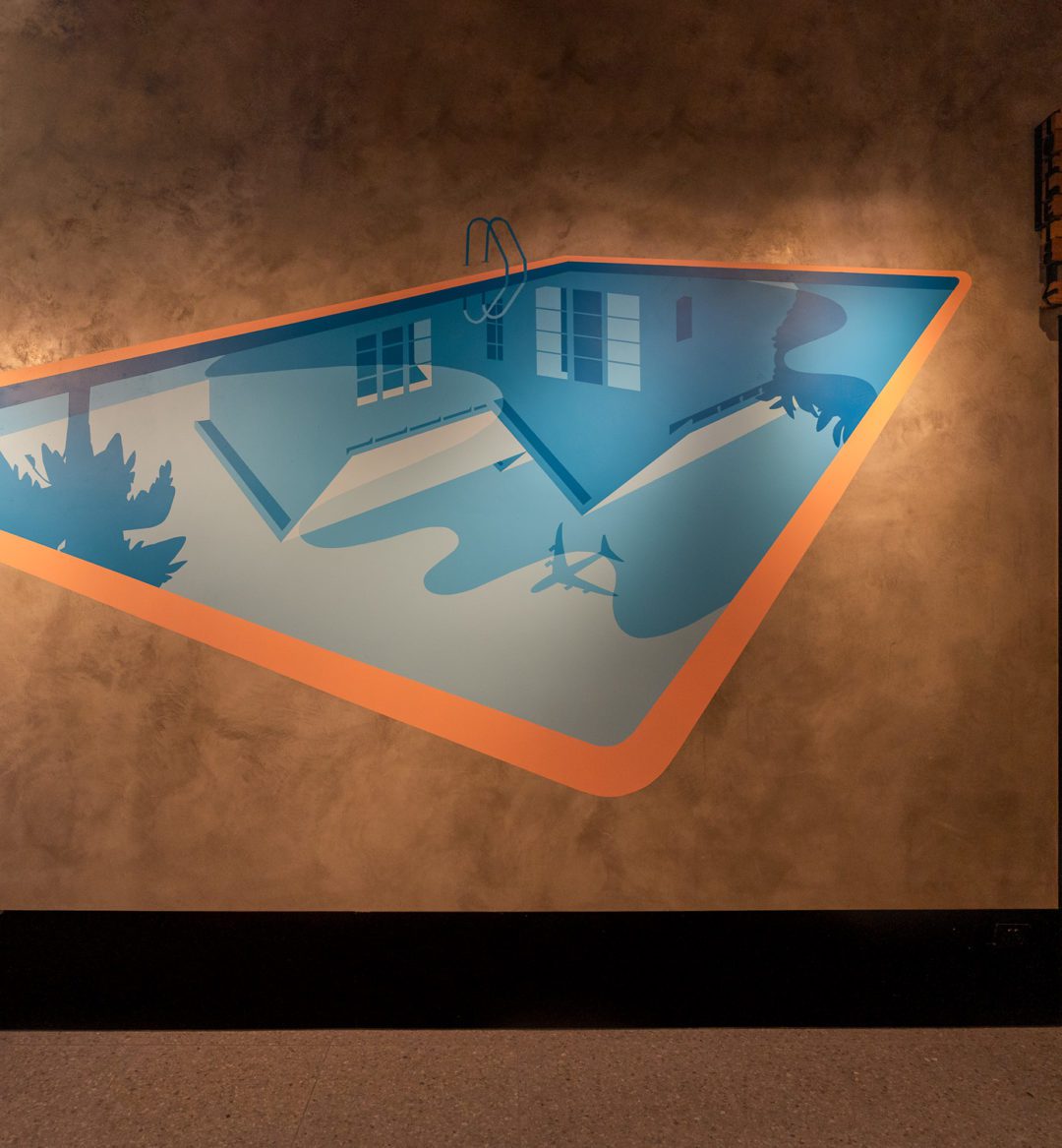
Guest Rooms
Sydney Ball
Lush Days, 2013
Gallery: Sullivan & Strumpf
Materials: Acrylic on handmade paper
Location: Ace Suite
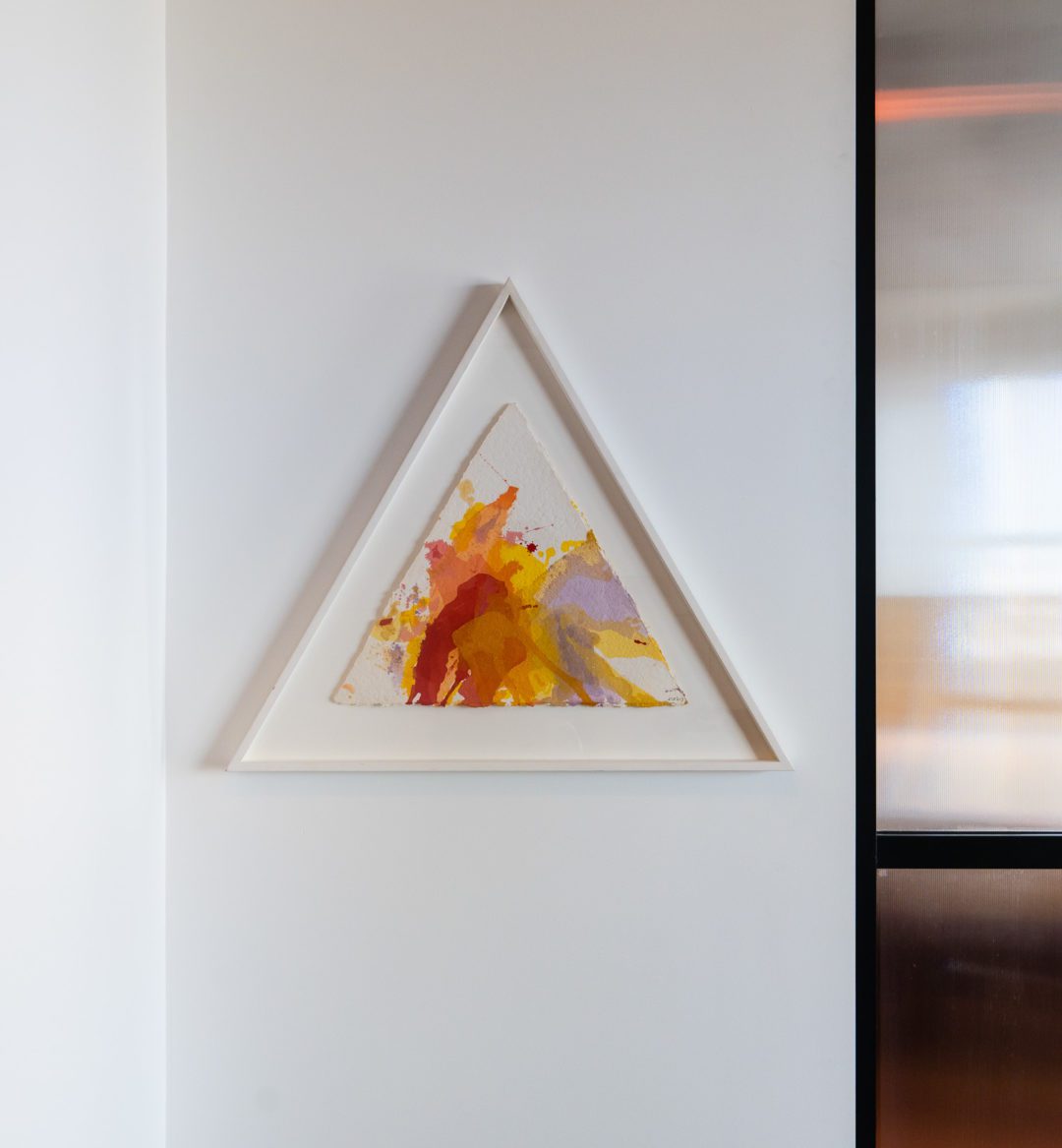
Sydney Ball
Blue Vista, 2014
Gallery: Sullivan & Strumpf
Materials: Acrylic on handmade paper
Location: Ace Suite
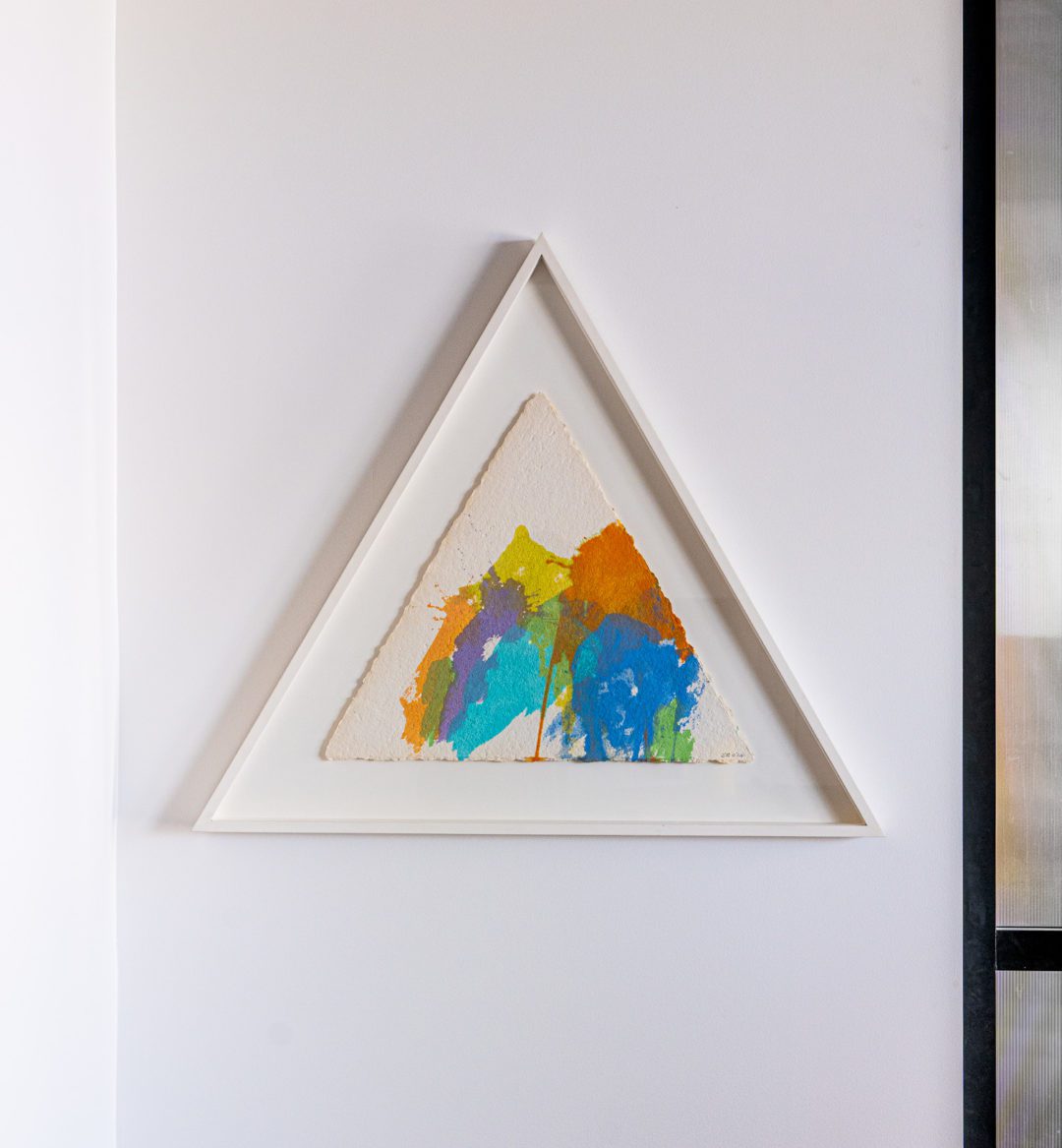
Barbara Cleveland
Meeting Time (Blue)
Gallery: Sullivan & Strumpf
Materials: Ink on paper
Location: Ace Suite
Barbara Cleveland is an Australian artist collective made up of Diana Baker Smith, Frances Barrett, Kate Blackmore and Kelly Doley. The group is named after a fictitious, ‘forgotten’ performance artist who produced art on the edges of society before disappearing in 1981. The collective’s work examines the legacy of its namesake, using queer and feminist theories to explore the way marginalized groups shape art history.
Barbara Cleveland’s projects have been shown at the Biennale of Sydney, Art Gallery of NSW, and London’s Hayward Gallery, and are held in the collections of Artbank and Sydney’s Museum of Contemporary Art.
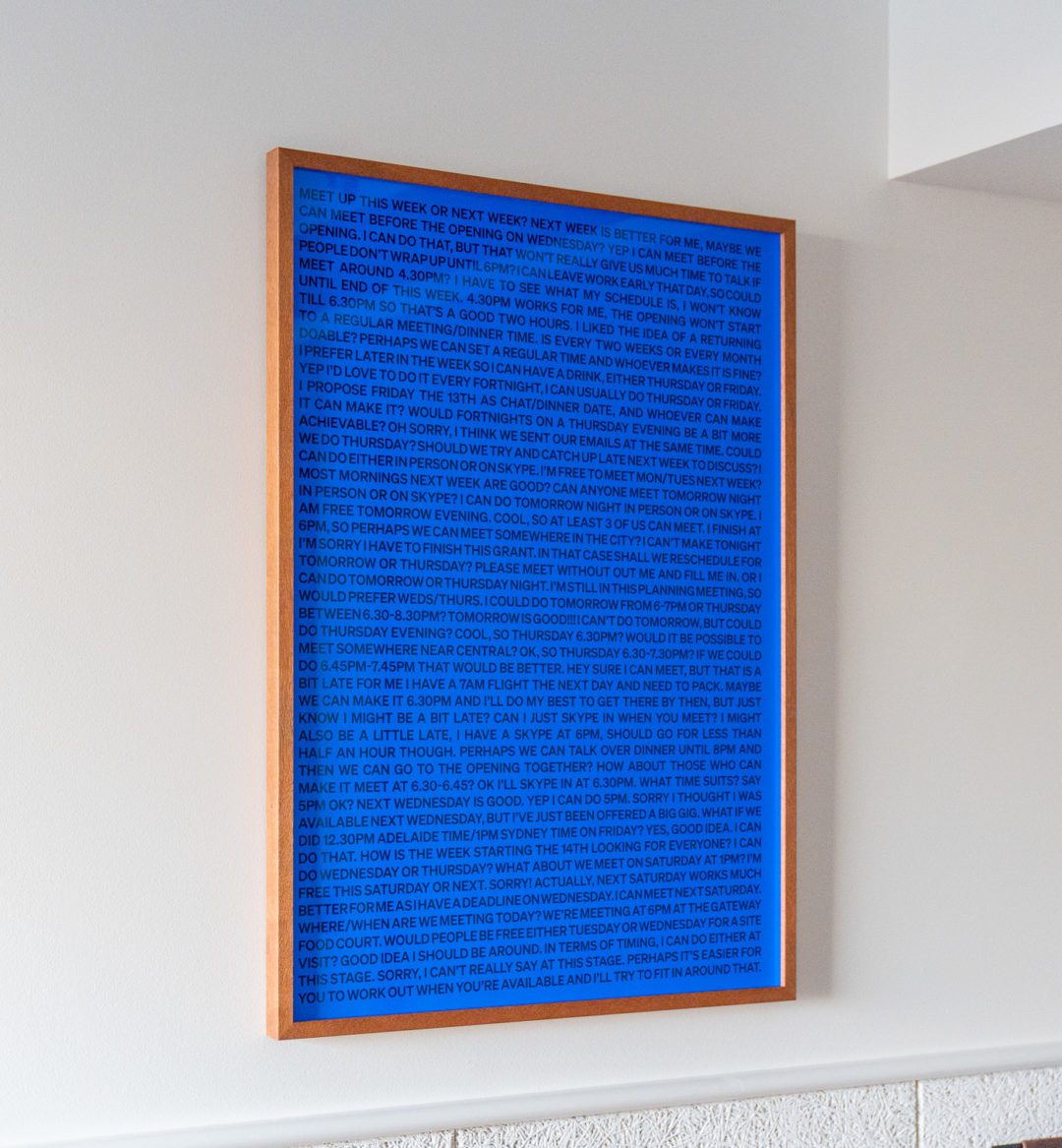
Barbara Cleveland
Meeting Time (Red)
Gallery: Sullivan & Strumpf
Materials: Ink on paper
Location: Ace Suite
Barbara Cleveland is an Australian artist collective made up of Diana Baker Smith, Frances Barrett, Kate Blackmore and Kelly Doley. The group is named after a fictitious, ‘forgotten’ performance artist who produced art on the edges of society before disappearing in 1981. The collective’s work examines the legacy of its namesake, using queer and feminist theories to explore the way marginalized groups shape art history.
Barbara Cleveland’s projects have been shown at the Biennale of Sydney, Art Gallery of NSW, and London’s Hayward Gallery, and are held in the collections of Artbank and Sydney’s Museum of Contemporary Art.
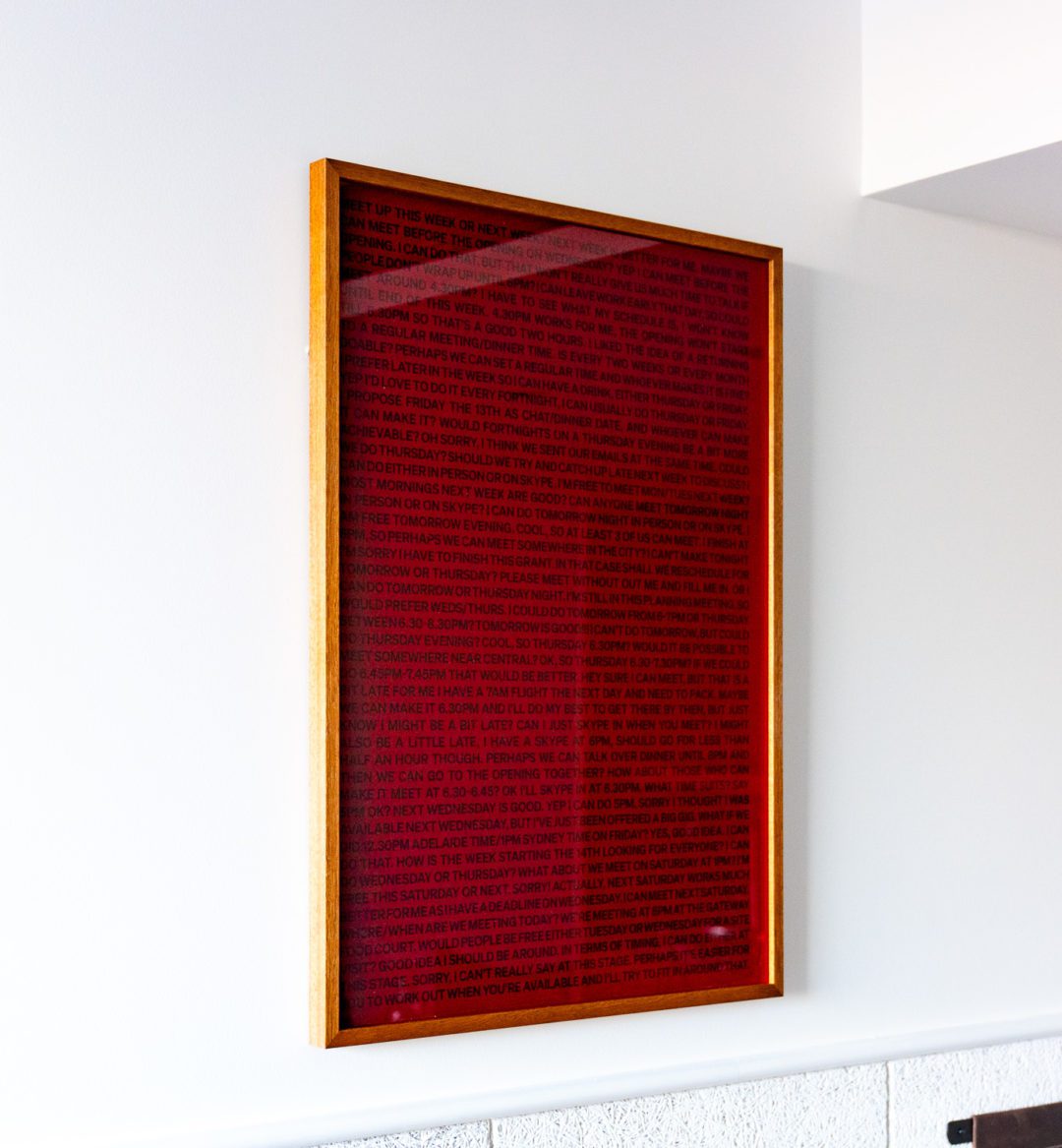
Scott Duncan
Commissioned various sculptures
Gallery: Egg & Dart
Materials: clay, glaze
Combining classical shapes with 1970s kitsch and vintage Australiana, Scott Duncan’s ceramics are unabashedly nostalgic. His work is a playful embrace of high and low aesthetics; a typical example might be a cardboard fruit box (actually made of clay) collaged with a traditional Italian Bitossi vessel. In addition to making ceramics, he’s the head chef of the Sydney cafe Fleetwood Macchiato.
Scott Duncan applies a broad approach to ceramics, making composite objects of real technical complexity. Handmade tools and selected glazes are used to achieve the collage-like effects which are then placed in the kiln as whole pieces. Playful in construction and ambiguous in function, the work is an egalitarian and open-ended invitation to enjoy aesthetics high and low.
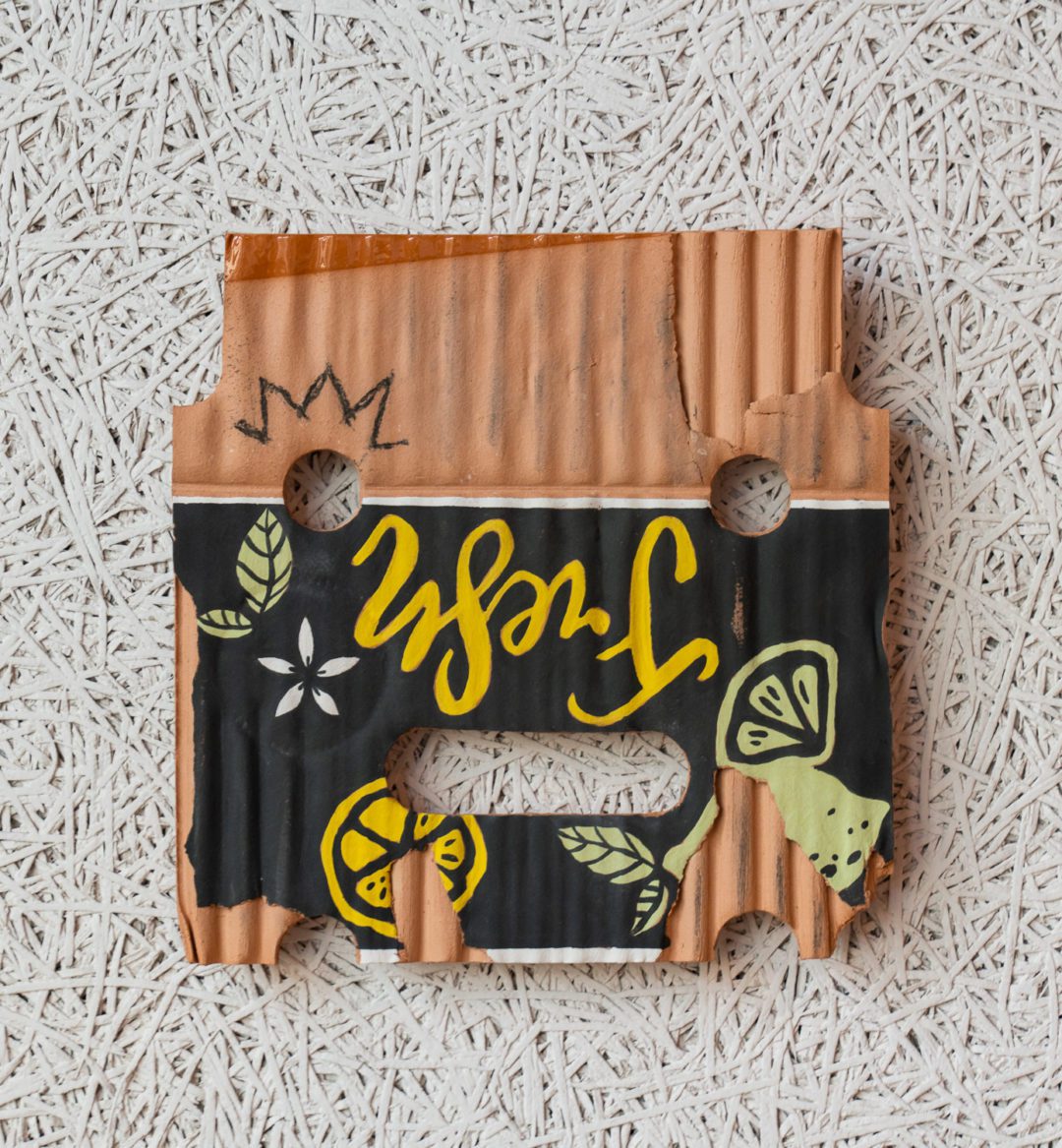
James Lemon
I ONCE KEPT A DEAD BIRD UNDER MY BED FOR 2 WEEKS BECAUSE IT WAS SO BEAUTIFUL, 2021
Materials: Acrylic, enamel, linen sheet
Location: Guest room
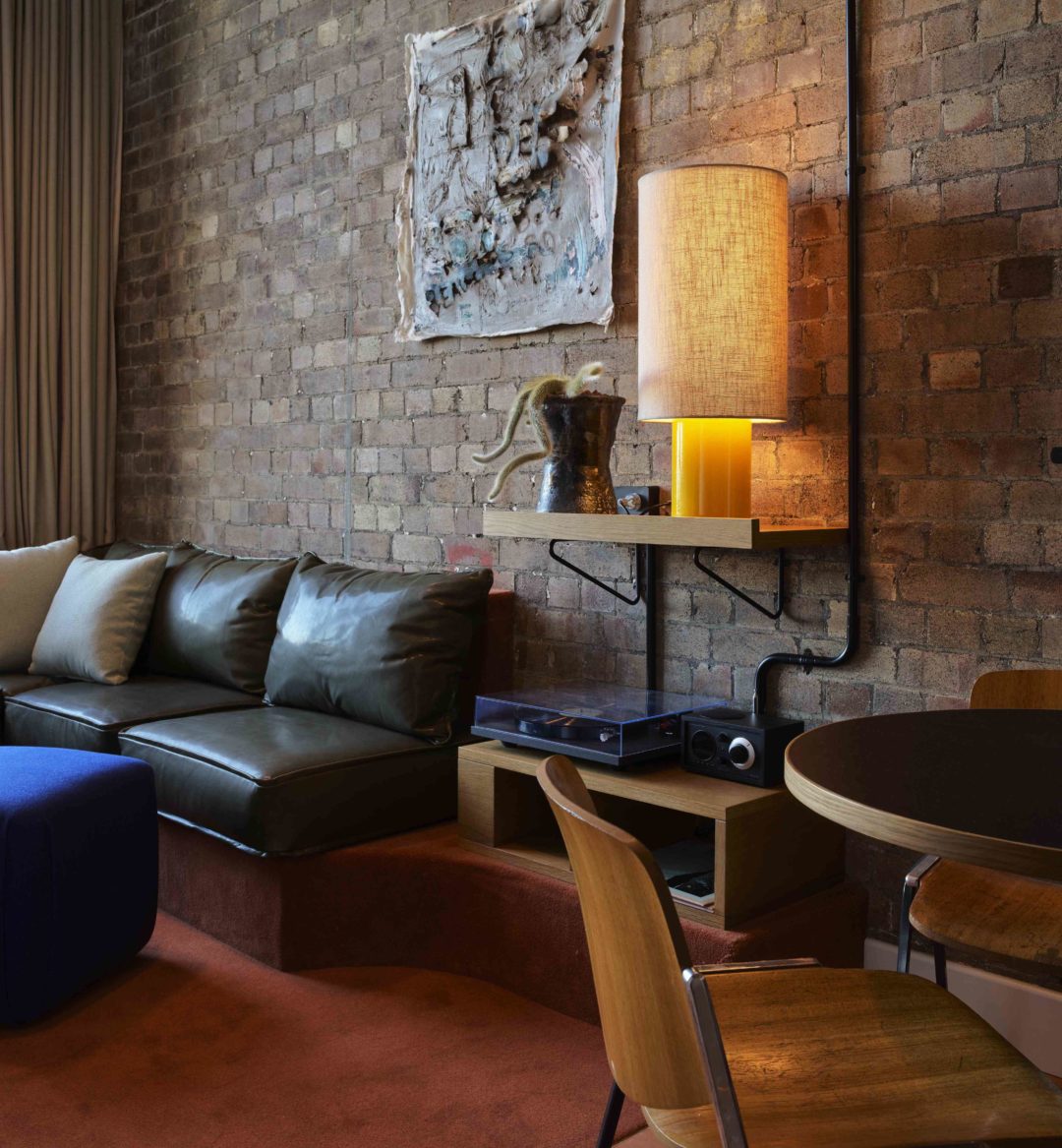
Michael Lindeman
Regression Painting (Boring), 2022
Gallery: Sullivan & Strumpf
Materials: Finger painted acrylic on mirror
Location: Ace Suite
Michael Lindeman’s large-scale text paintings, drawings, and sculptures are an exploration into his own identity as an artist. Drifting between stream-of- consciousness writing and institutional critique, Lindeman’s work shines a light on the mechanics of the contemporary art world and his place within it.
His work creates an absurd dialogue with the viewer, one in which the artist activates repressed impulses, embodies alienation, and disrupts convention in order to raise questions about the commodification of art and cultural taste. Lindeman has exhibited in a number of exhibitions nationally and internationally. He has been recognised in multiple awards and prizes, and most recently was awarded the Percival Portrait Painting Prize 2022. The artist currently lives and works in Sydney.
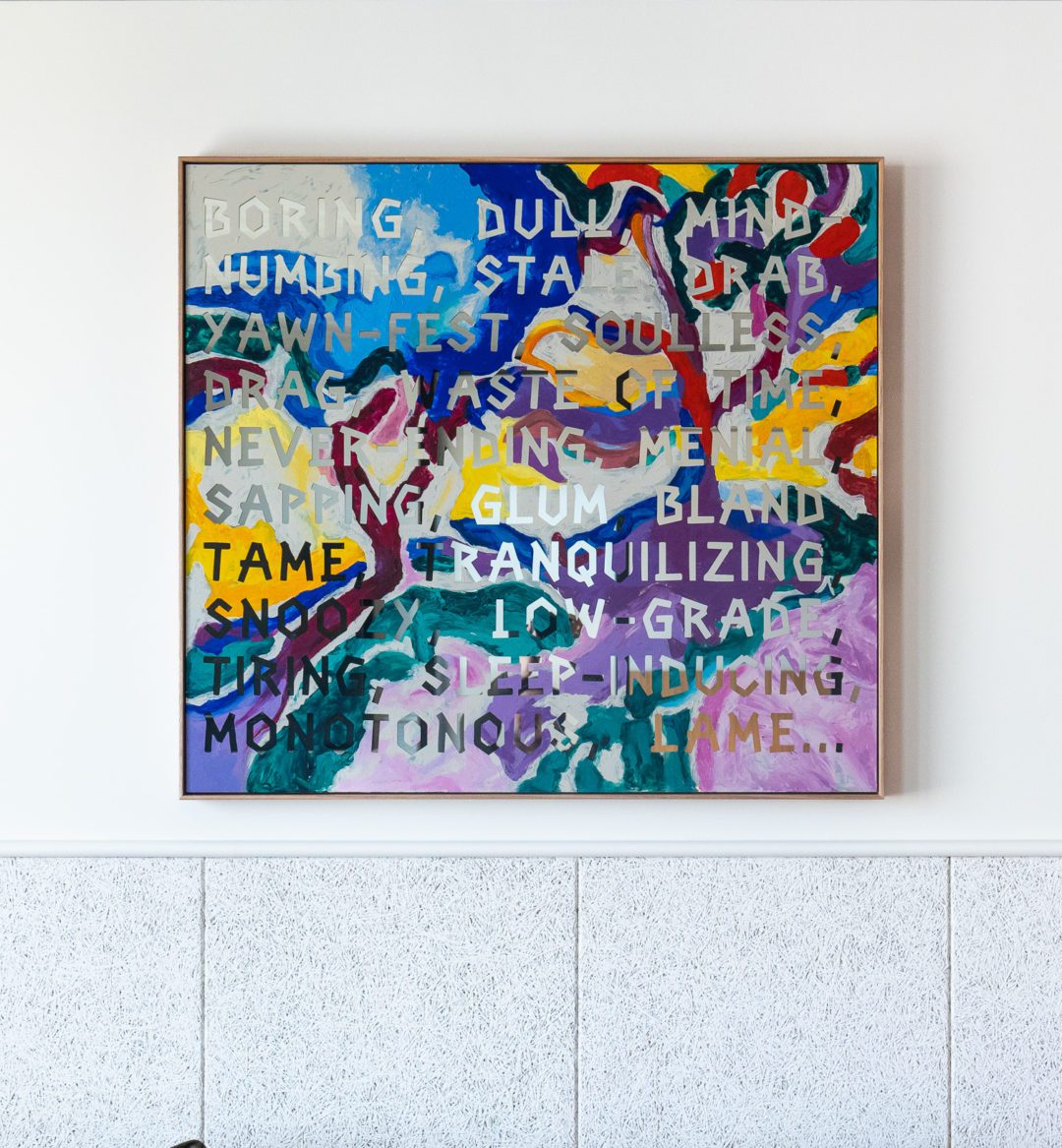
Michael Lindeman
Regression Painting (Tactics), 2022
Gallery: Sullivan & Strumpf
Materials: Finger painted acrylic on mirror
Location: Ace Suites
Michael Lindeman’s large-scale text paintings, drawings, and sculptures are an exploration into his own identity as an artist. Drifting between stream-of- consciousness writing and institutional critique, Lindeman’s work shines a light on the mechanics of the contemporary art world and his place within it.
His work creates an absurd dialogue with the viewer, one in which the artist activates repressed impulses, embodies alienation, and disrupts convention in order to raise questions about the commodification of art and cultural taste. Lindeman has exhibited in a number of exhibitions nationally and internationally. He has been recognised in multiple awards and prizes, and most recently was awarded the Percival Portrait Painting Prize 2022. The artist currently lives and works in Sydney.
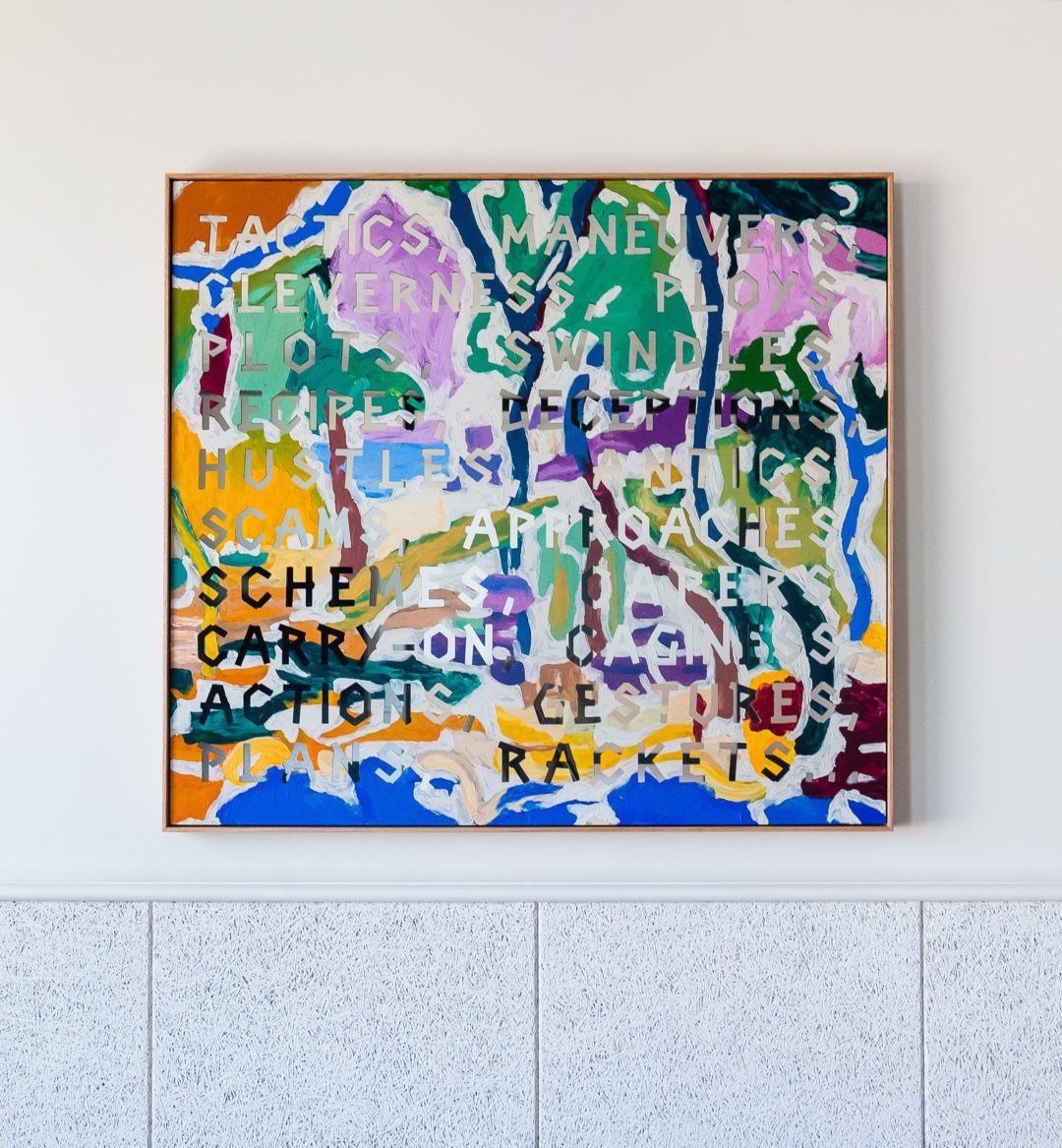
Jason Phu
navigating the ways of the heart over the mountains and through the seas, 2022
Gallery: STATION
Materials: Ink on rendered walls
Location: Guest room corridors (multiple)
